As the days of generous inflow of capital into the ecosystem melted into investors exercising caution for months, the Indian entrepreneurial spirit has remained unaffected
Even though the ongoing funding winter has overstayed its welcome, Indian startups continue to add muscle to the world’s third-largest startup ecosystem
In the 40th edition of ‘30 Startups To Watch’, we have covered startups from a range of sectors, including cleantech, generative AI and D2C, just to count a few
Ever since launching the first edition of ‘30 Startups To Watch’ in February 2020, Inc42 has aided the discovery of 1,200+ new startups. In this journey of more than three years, we have kept a close watch on the Indian startup ecosystem, which underwent significant transformations — some much-needed, others forced by market conditions.
As the days of generous inflow of capital into the ecosystem turned into investors exercising caution for months on end, the Indian entrepreneurial spirit has remained largely unaffected. More and more founders are entering the Indian startup ecosystem with more grit and ambitions to solve real-world problems with their Midas touch.
It is off the back of this positive stead that the number of government-recognised startups in the country has more than tripled since 2020 to 1 Lakh as of September 2023. This is exactly what has fuelled our ambition to find more pathbreaking new-age ventures over the years, as we remain steadfast in our mission of identifying newer startups every month.
With that said, we present the 40th edition of ‘30 Startups To Watch’. We believe these ventures have immense potential to not only disrupt their respective playgrounds but also transform the world. In this edition, we have covered startups from various sectors, including cleantech, generative AI and D2C, among many others.
Before we set the stage for this month’s 30 startups, we should also mention the ongoing funding winter and the fact that it has dragged on for too long.
Making it 18 months of near-continuous decline in the third quarter of 2023, startup funding was at a three-quarter low of a mere $1.7 Bn, according to Inc42’s ‘Indian Startup Funding Report Q3 2023’ report. Further, year-on-year funding for this period tanked by 43.8%, with funding deals plummeting 38.6% compared to Q3 2022.
Despite this, Indian entrepreneurs have displayed remarkable resilience and determination. And rather than retreating, more and more new ventures continue to add muscle to the world’s third-largest startup ecosystem.
Editor’s Note: The list below is not a ranking of any kind. We have listed the startups alphabetically.
altM
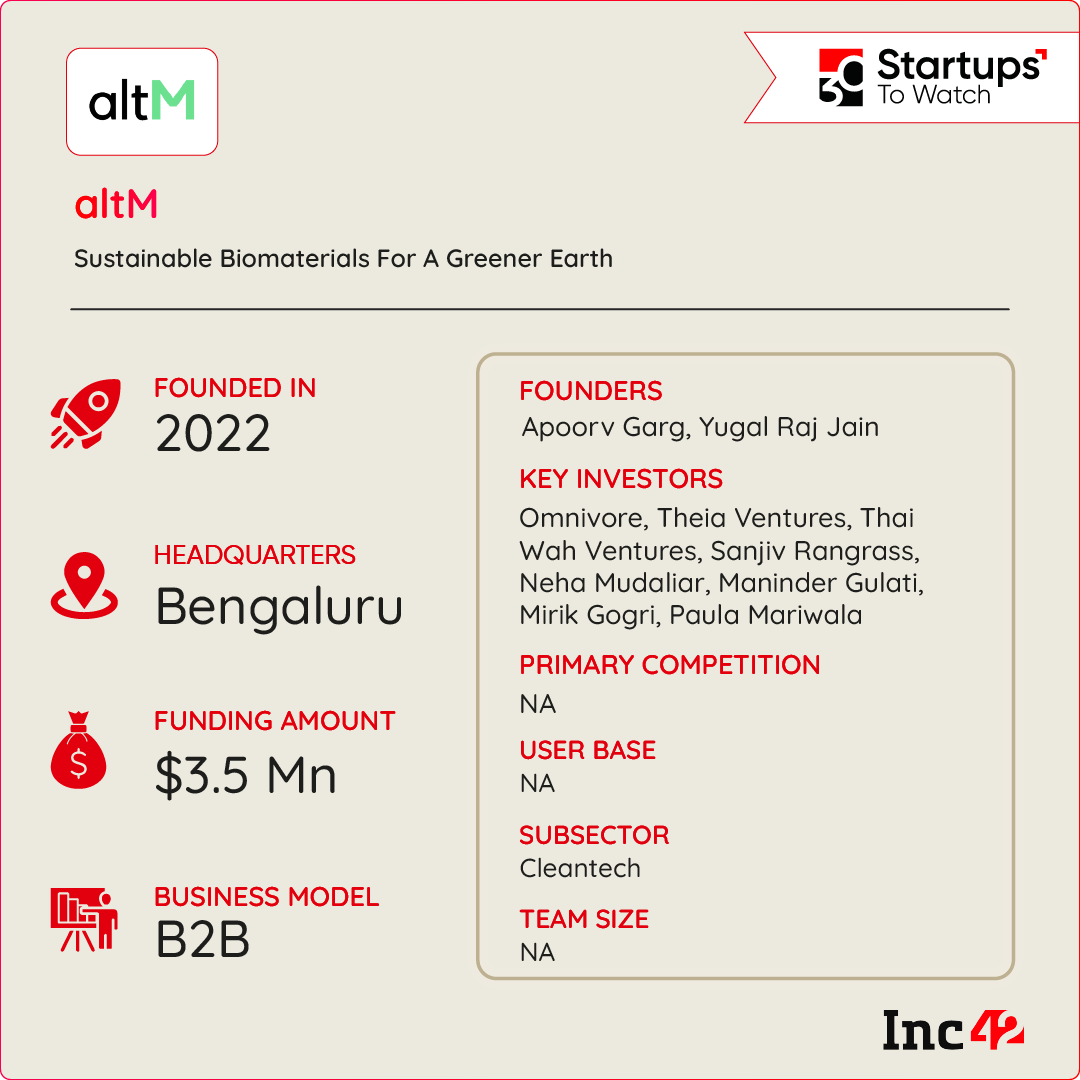
Sustainable Biomaterials For A Greener Earth
As the world seeks alternatives to environmentally harmful materials, biomaterials sourced from agricultural residue have gained prominence. While a majority has turned to recycled materials, biomaterials – materials sourced from crop residue – are another key variable in the sustainability equation.
Addressing the need for these biomaterials materials is altM. Founded in 2022 by Apoorv Garg and Yugal Raj Jain, both ex-Tesla employees, altM aims to develop and manufacture sustainable materials from agricultural residue to help companies reduce their carbon footprints and increase circularity in their supply chains.
altM uses lignocellulosic agricultural residues as their raw material to produce advanced materials as alternatives to unsustainable incumbents. Lignocellulosic residue refers to dry plant residue and includes wheat, rice, barley straw, corn stover, sorghum stalks, coconut husks, sugarcane bagasse and banana leaves.
Given its sustainability potential and functional properties, lignocellulosic residue can be used to develop materials such as paper, biofuels and polymers.
AppEQ.ai
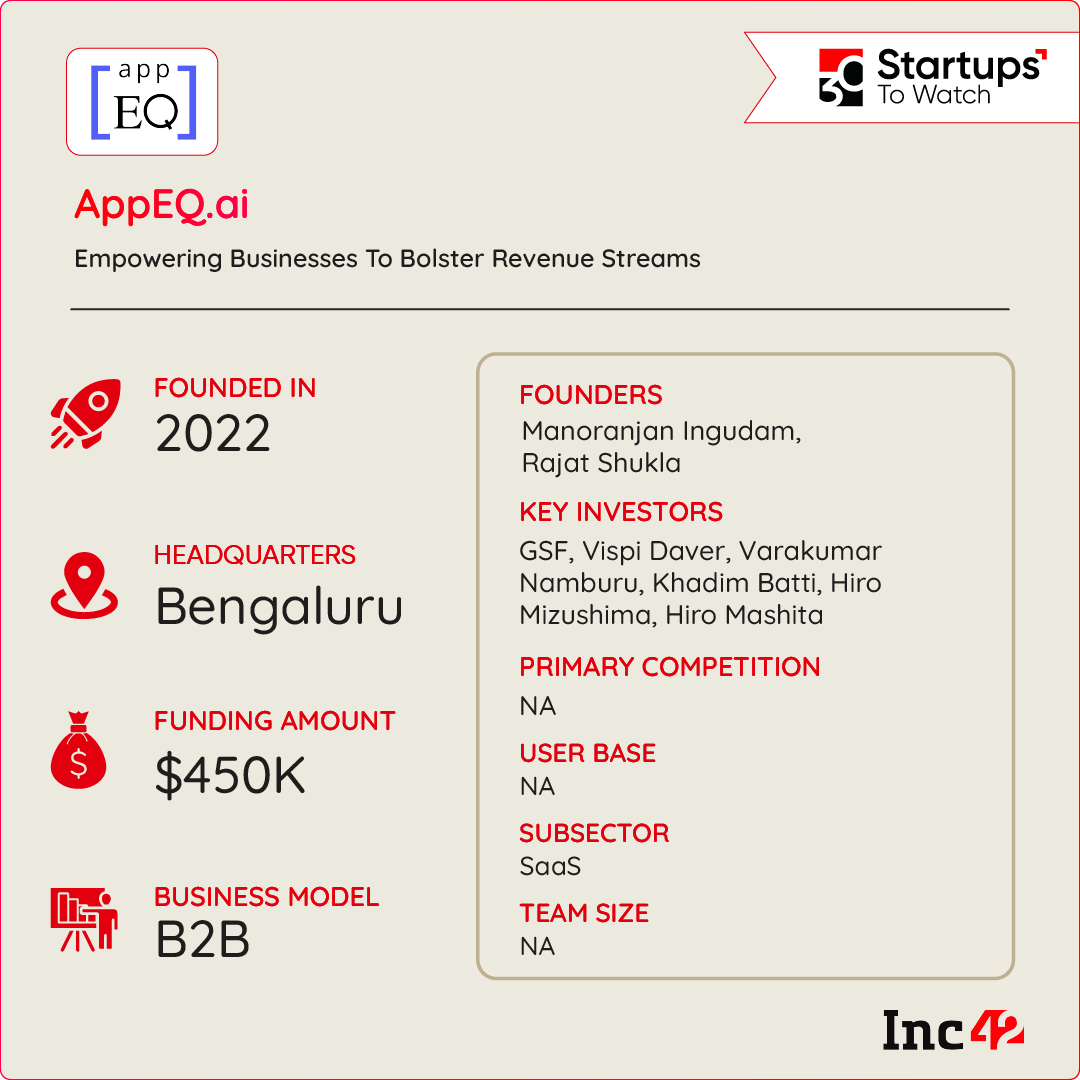
Empowering Businesses To Bolster Revenue Streams
Retaining existing customers is the top priority for product-based companies, as customer churn can significantly impact their bottom line. AppEQ.ai, founded by Rajat Shukla and Manoranjan Ingudam, offers an AI-based copilot platform to help businesses preserve their revenue streams by improving customer retention.
AppEQ.ai provides a unified view of each customer account by integrating seamlessly with a company’s existing CRM and help desk systems. By using machine learning, it generates valuable customer insights, identifies patterns, and detects trends that can be used to enhance customer retention strategies.
For example, the platform can flag customers who haven’t recently used a product or contacted customer support, enabling proactive measures to address their needs. It also identifies upselling and cross-selling opportunities, boosting revenue retention.
AppEQ.ai offers a subscription-based pricing model starting at $25 per user per month, with pricing tiers based on features and the number of users.
In the competitive landscape of customer retention, AppEQ.ai empowers businesses with actionable insights to reduce churn and bolster revenue.
Aretto
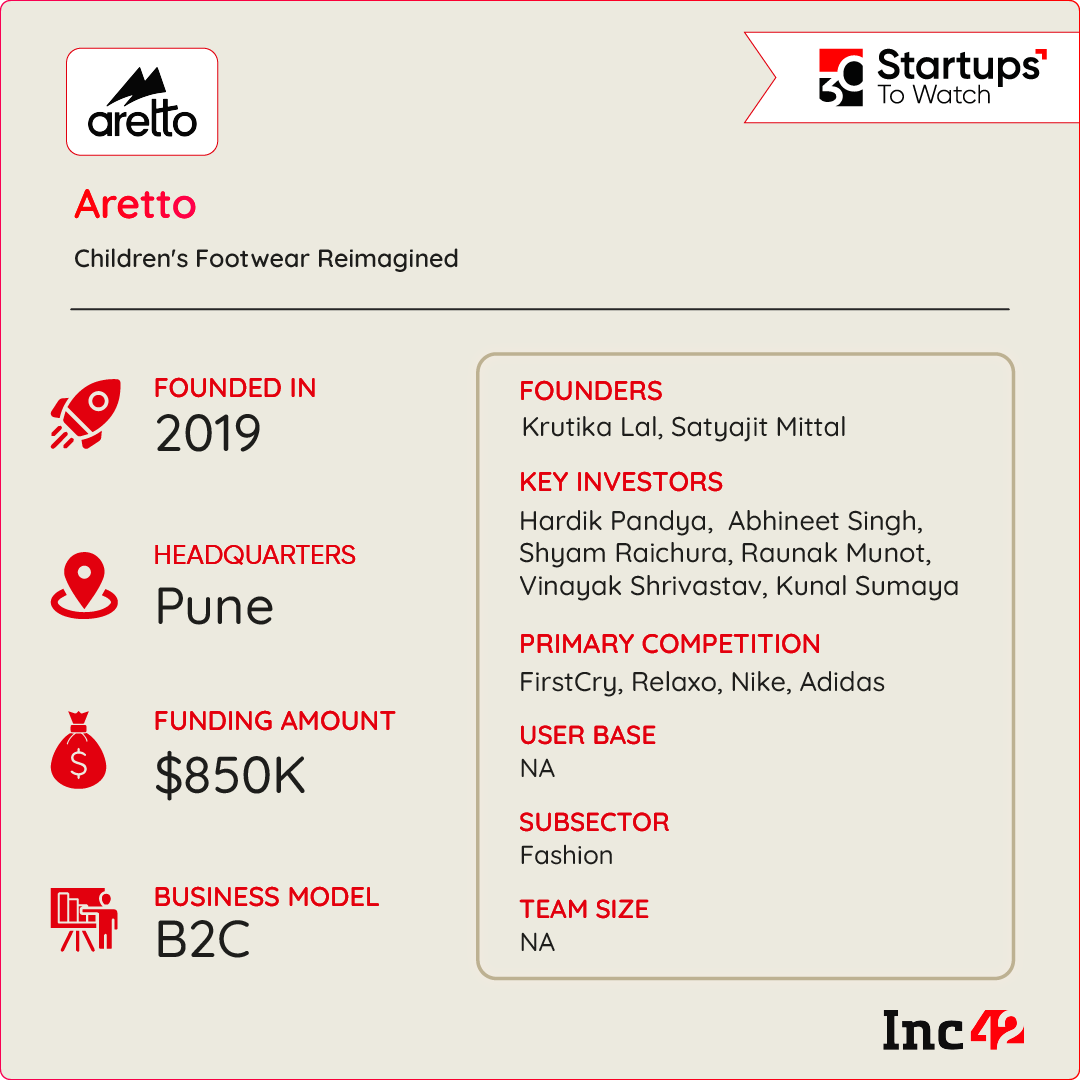
Ultimate Comfort For Growing Feet
Founded in 2022 by Krutika Lal and Satyajit Mittal, Aretto is a kids’ footwear brand. It wants to emerge as a prominent player in the children’s footwear market in India while offering quality, and comfort for young wearers.
Earlier this year, Aretto secured a patent for its innovative sole technology, making it one of the pioneering brands in India to receive such recognition.
Aretto’s unique selling proposition lies in the ability of its products to intuitively sense and adapt to children’s growth patterns, expanding up to 3 sizes to provide the perfect fit.
Looking ahead, Aretto has plans for global expansion, targeting markets such as the US, the UK, and the UAE. Currently headquartered in Pune, Aretto is poised to introduce a comprehensive product line in the children’s footwear market.
Aroleap
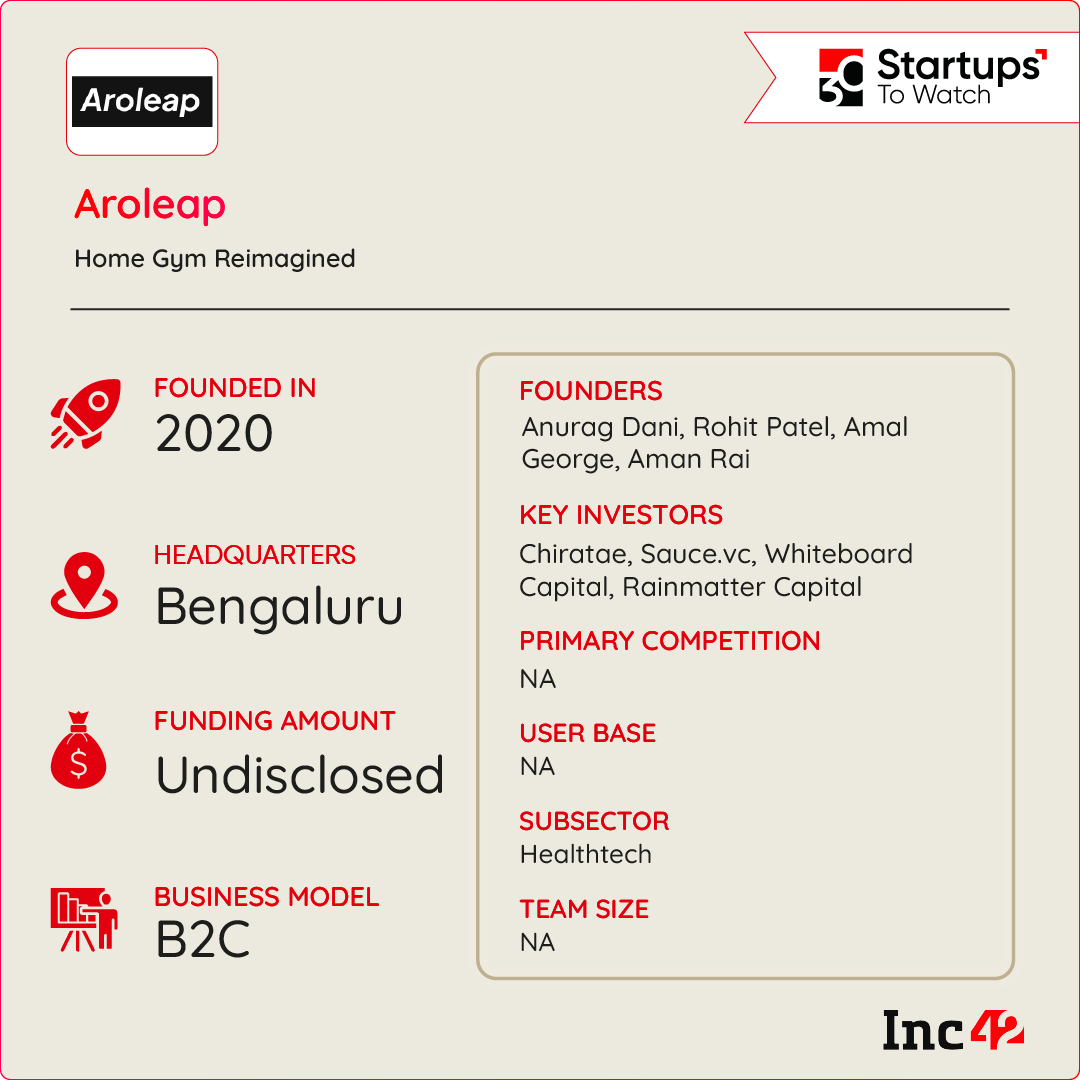
Home Gym Reimagined
Lifestyle diseases like diabetes and obesity are on the rise in India, especially in the country’s metropolitan and Tier I and II cities. One of the major contributors to this rising trend is that more and more Indians have distanced themselves from following a healthy lifestyle due to their ever-increasing workload to put bread on the table. As per a recent survey, only about 0.5% of India’s total population goes to a gym or exercise regularly.
With a vision to democratise data-driven personal training for preventive healthcare, Anurag Dani, Rohit Patel, Amal George, and Aman Rai founded Aroleap in 2020.
The startup uses cutting-edge technology to deliver personalised insights and training built on strong foundations of science-backed fitness knowledge. Its Aroleap X is a smart, wall-mounted gym equipment designed for comprehensive weight training.
What sets the Aroleap X apart is its patented motor-powered electromagnetic resistance technology, which simulates the sensation of traditional weights. This groundbreaking equipment is effective and portable as it occupies very little wall space, making it a practical choice for all.
Not just this, Aroleap goes beyond conventional fitness equipment by precisely tracking user movements and mapping strength-related data, which is then utilised to identify imbalances and tailor a highly personalised fitness regime based on individual goals, strengths, and weaknesses.
Aroleap primarily operates in the B2C segment and has priced its home gym, the Aroleap X, at a competitive price of INR 1.99 Lakh per unit. Furthermore, the startup has strategically partnered with various hospitality chains to accommodate bulk orders, expanding its reach and influence in the fitness industry.
Bitsila
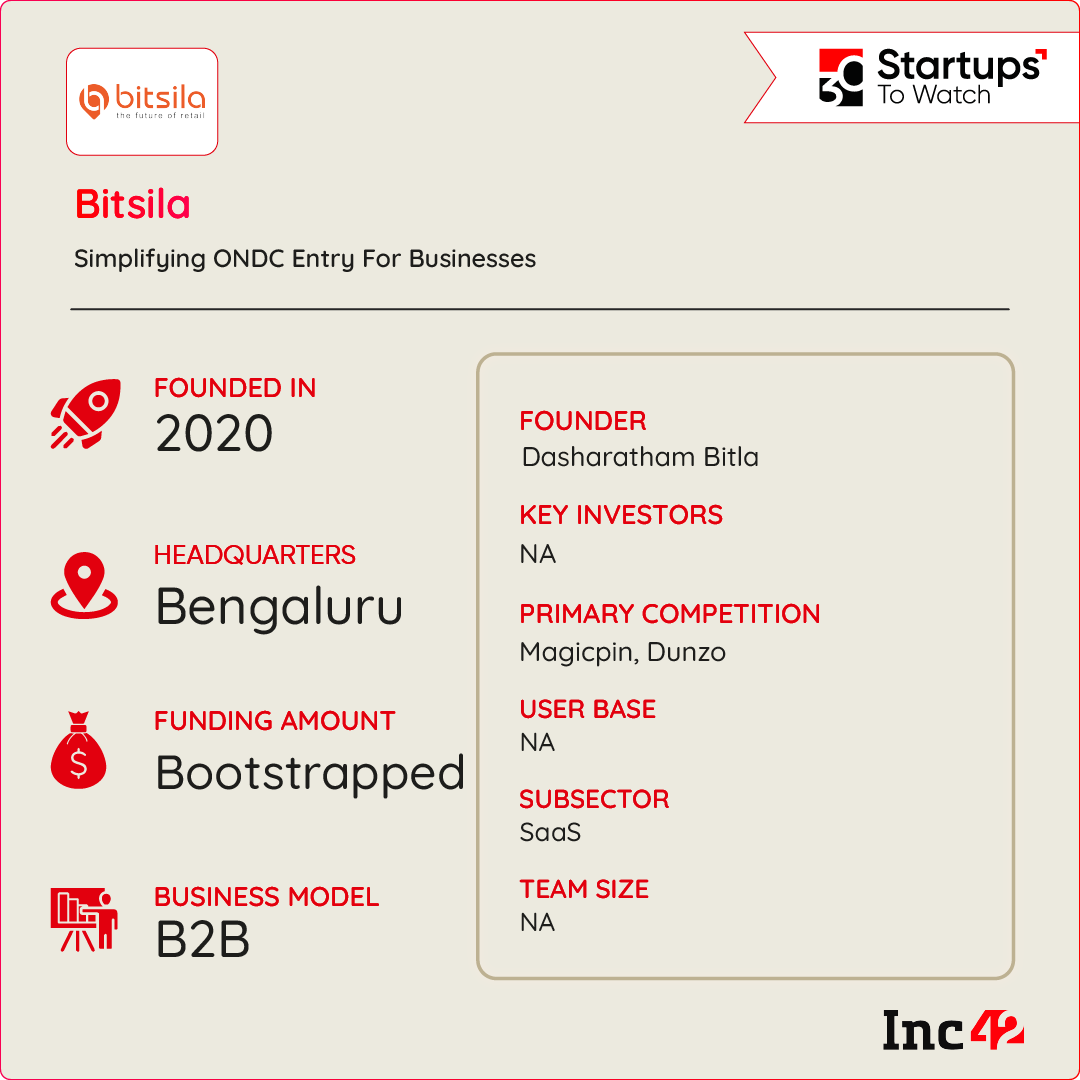
Simplifying ONDC Entry For Businesses
The Open Network for Digital Commerce (ONDC) has gained significant traction in the Indian ecommerce segment over the past few months, with numerous startups and enterprises now joining the government’s digital commerce network. However, setting up shop on the ONDC network can be challenging for less tech-savvy companies.
Bitsila, established by Dasharatham Bitla in 2020, aims to assist these companies in joining the ONDC ecosystem. This SaaS startup provides an integrated platform that facilitates connections with all ecommerce channels, including ONDC. Once onboarded on Bitsila’s platform, a seller can link their retail ERP to all ecommerce channels.
Some prominent users of the startup’s platform include BigBasket, Rebel Foods, Himalaya Wellness, and Glenmark Pharma, among others. Bitsila monetises its platform through transactional commissions on all orders and SaaS charges for software usage.
Currently, the startup is working toward onboarding 500 major enterprises to become a full-fledged network partner of ONDC, with long-term ambitions to bring in 2.5 Lakh companies by 2026.
Boxs
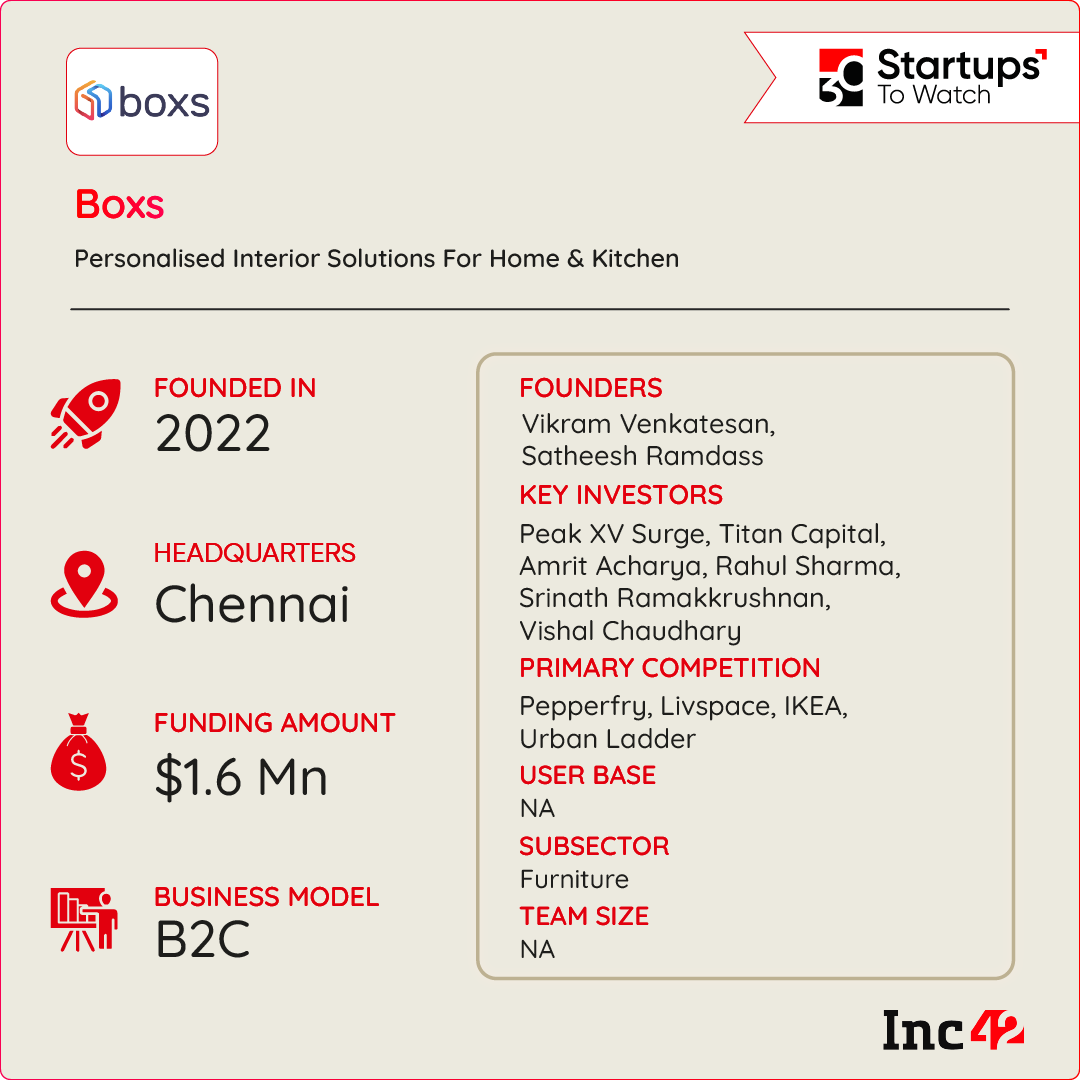
Personalised Interior Solutions For Home & Kitchen
The world of interior design and construction has evolved beyond mere aesthetics, and this transformation has been evident in the current market landscape. Startups such as Pepperfry, Urban Ladder, Livspace, and HomeLane have emerged in recent years, bringing both style and substance to the interior designing industry. However, these brands often provide limited personalisation options, and modular choices are scarce.
Founded in 2022 by Vikram Venkatesan and Satheesh Ramdass, Chennai-based Boxs offers a comprehensive solution for all interior needs. The platform features an innovative online tool that empowers users to create modular designs and instantly calculates the cost for their specifications.
This online tool allows users to upload their renditions and seamlessly integrate Boxs products, enhancing customisation and creativity. Boxs components are fully parametric, complete with precise measurements to help users visualise their desired interior.
The platform boasts an extensive catalogue of over 10,000 SKUs. Once users have crafted their ideal designs, they can order products directly from Boxs and have them delivered to their doorstep.
Cirkla
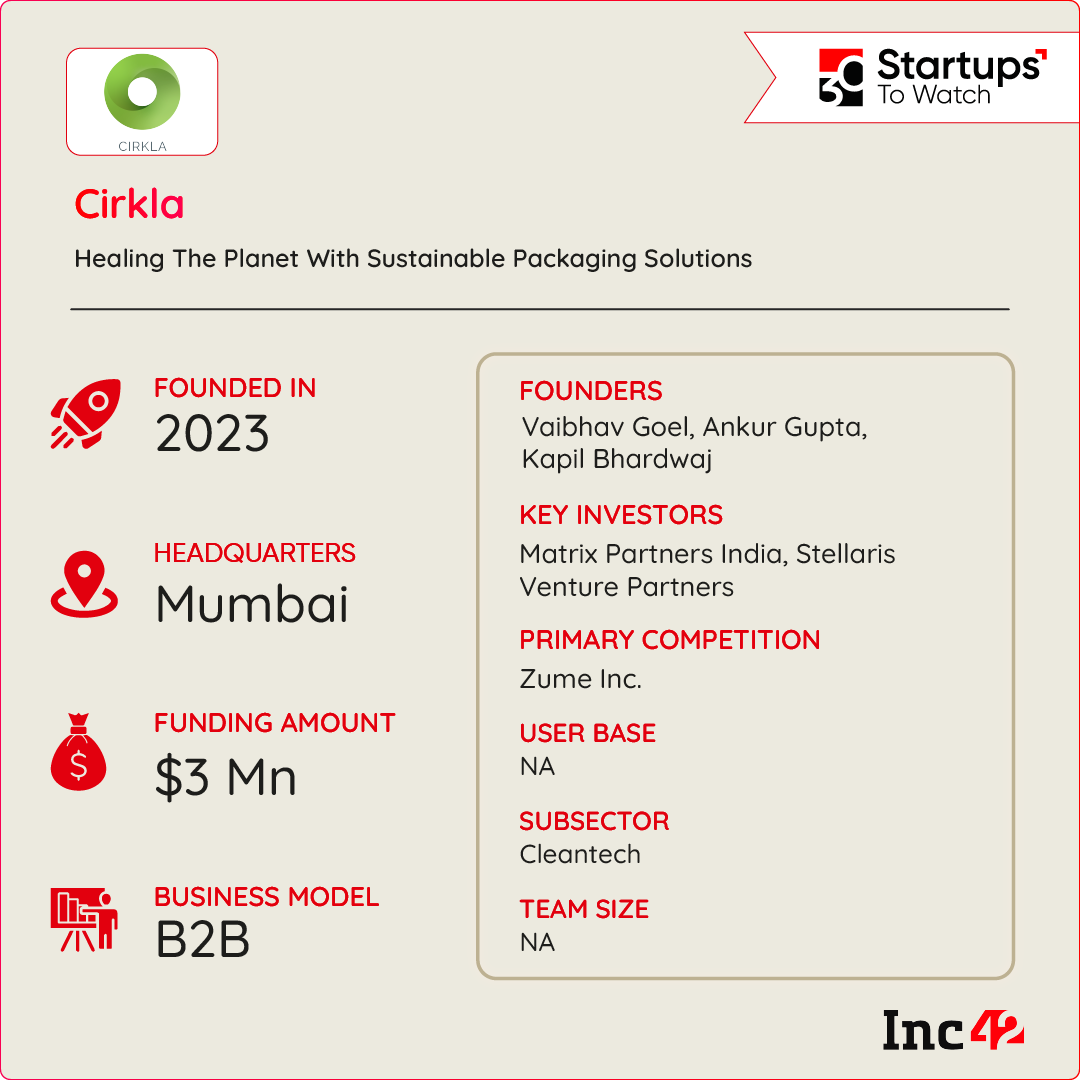
Healing The Planet With Sustainable Packaging Solutions
Packaging is a leading contributor to global pollution as this industry accounts for nearly half of all plastic waste generated worldwide.
To address this issue, Vaibhav Goel, along with Ankur Gupta and Kapil Bhardwaj, founded Cirkla in 2019 to supply sustainable packaging solutions to enterprises. Cirkla maintains a vast network for sales and manufacturing, offering various categories, including moulded fibre, recycled polymers, pulp, paper, and advanced technologies.
The startup has developed proprietary life cycle assessment models, enabling businesses to evaluate the environmental impact of their packaging and prioritise SKUs for maximum sustainability. Additionally, Cirkla has an in-house packaging development team that designs alternative solutions using sustainable materials, meeting functional requirements while remaining cost-competitive.
Cirkla generates revenue through designing, prototyping, and assessment services, as well as by supplying packaging. The startup now plans to expand its presence in the US and EU.
EaseMyAI
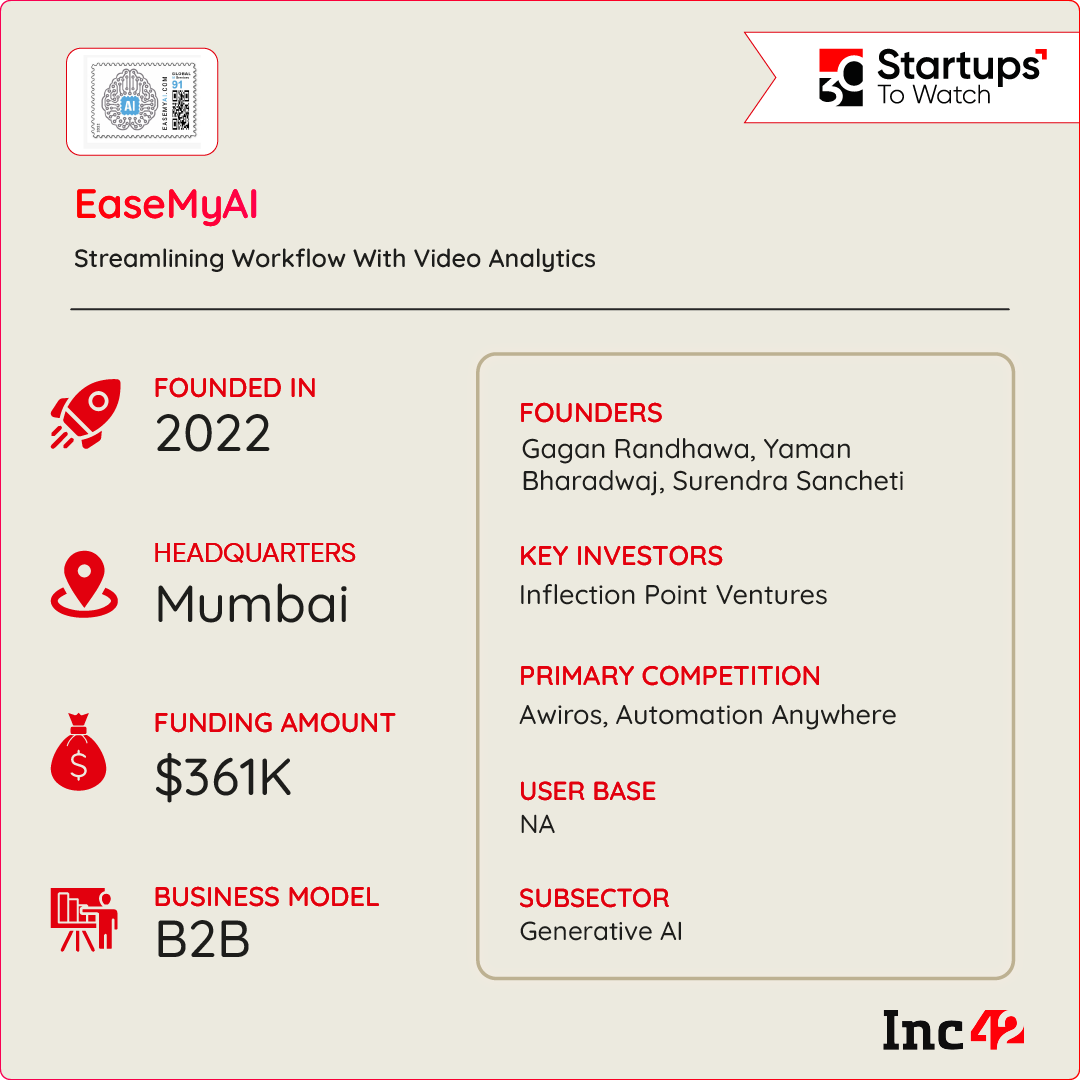
Streamlining Workflows With Video Analytics
In recent years, video analytics technology has made significant advancements, expanding its applications far beyond traditional security and surveillance. Recognising the potential of video analytics, Gagan Randhawa and Yaman Bharadwaj incorporated EaseMyAI in 2022.
The founders have built a platform that extracts data from videos, IoT sensors, audio devices and third-party software, enabling AI-driven decision-making and end-to-end process automation.
The startup also provides a marketplace for AI and traditional IT companies to access, upload and download various business use cases and services to customise their dashboard and automate their specific workflows.
EaseMyAI charges clients through a subscription-based model, with pricing ranging from $2 to $1,000 per month per AI model or IoT device. The Mumbai-based startup claims to have secured 20 clients across sectors. Its use cases include railway track defect monitoring, textile quality control, and gunshot detection.
With a team of 25 and month-on-month revenue growth of 15%, Ease My AI wants to enter the US market through partnerships with AWS and Microsoft.
Ellipsol
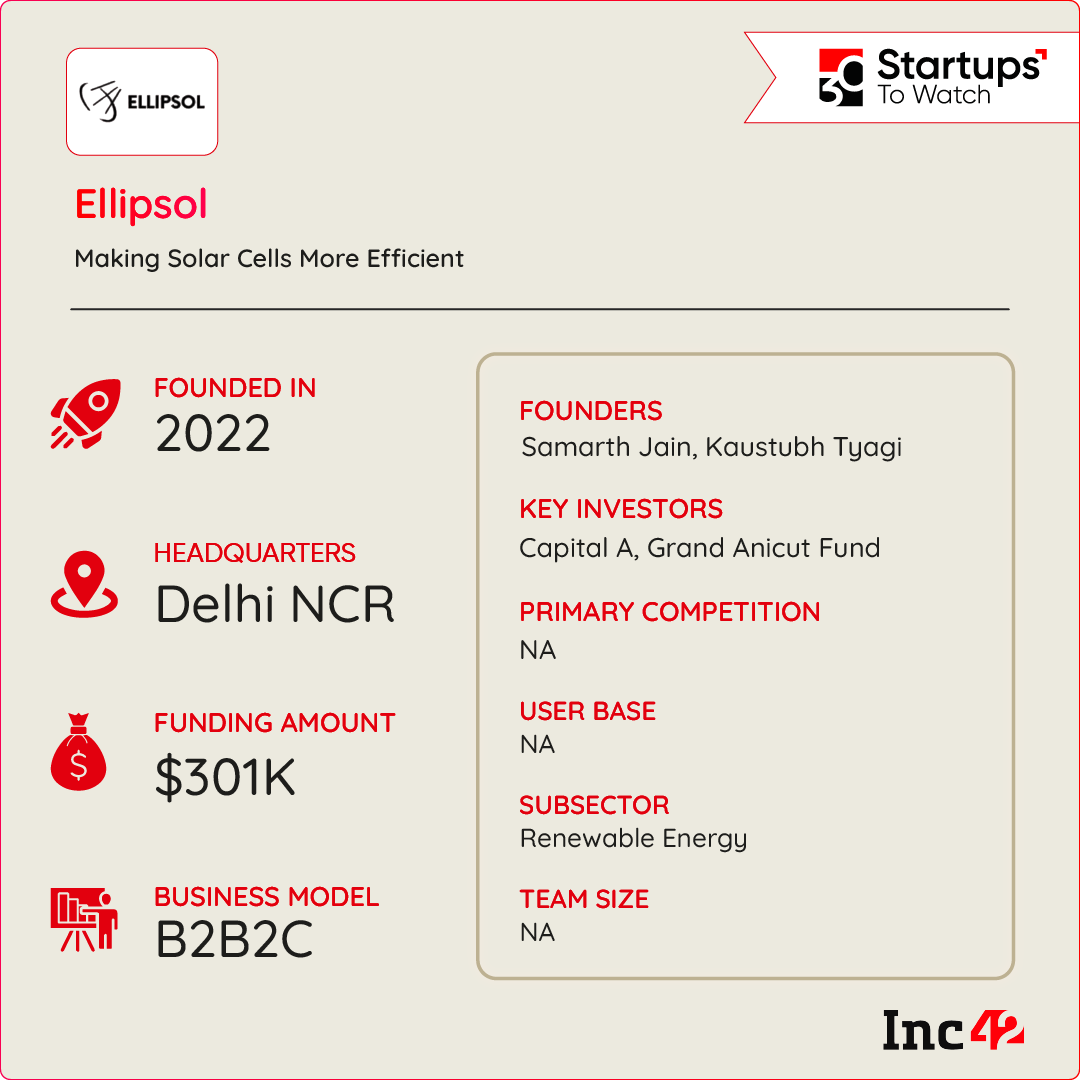
Making Solar Cells More Efficient
A typical photovoltaic cell can only convert around 15-20% of the sunlight it receives into electricity, making it a less efficient process than generating electricity from other renewable sources such as wind (30-40%) and hydroelectricity (90%).
Ellipsol, a Delhi NCR-based startup founded in 2022 by Samarth Jain and Kaustubh Tyagi, claims to “Brighten The Sun” by doubling the energy generation capability of a solar panel at only 10% additional cost. To be sure, there are several ways the efficiency of a solar panel can be improved – anti-reflective coatings and microinverters can take the efficiency up from around 15% to 20%, but none of the conventional methods doubles it.
The startup’s core product is a retrofittable solution, which it claims can double the yield of conventional photovoltaic solar panels. It can potentially be installed across all existing solar panels.
Jain and Tyagi, who have previously worked together on an energy storage startup, Baud Resources, are currently working in stealth mode. As such, the specifics of the technology behind Ellipsol’s solution remain undisclosed.
Floik
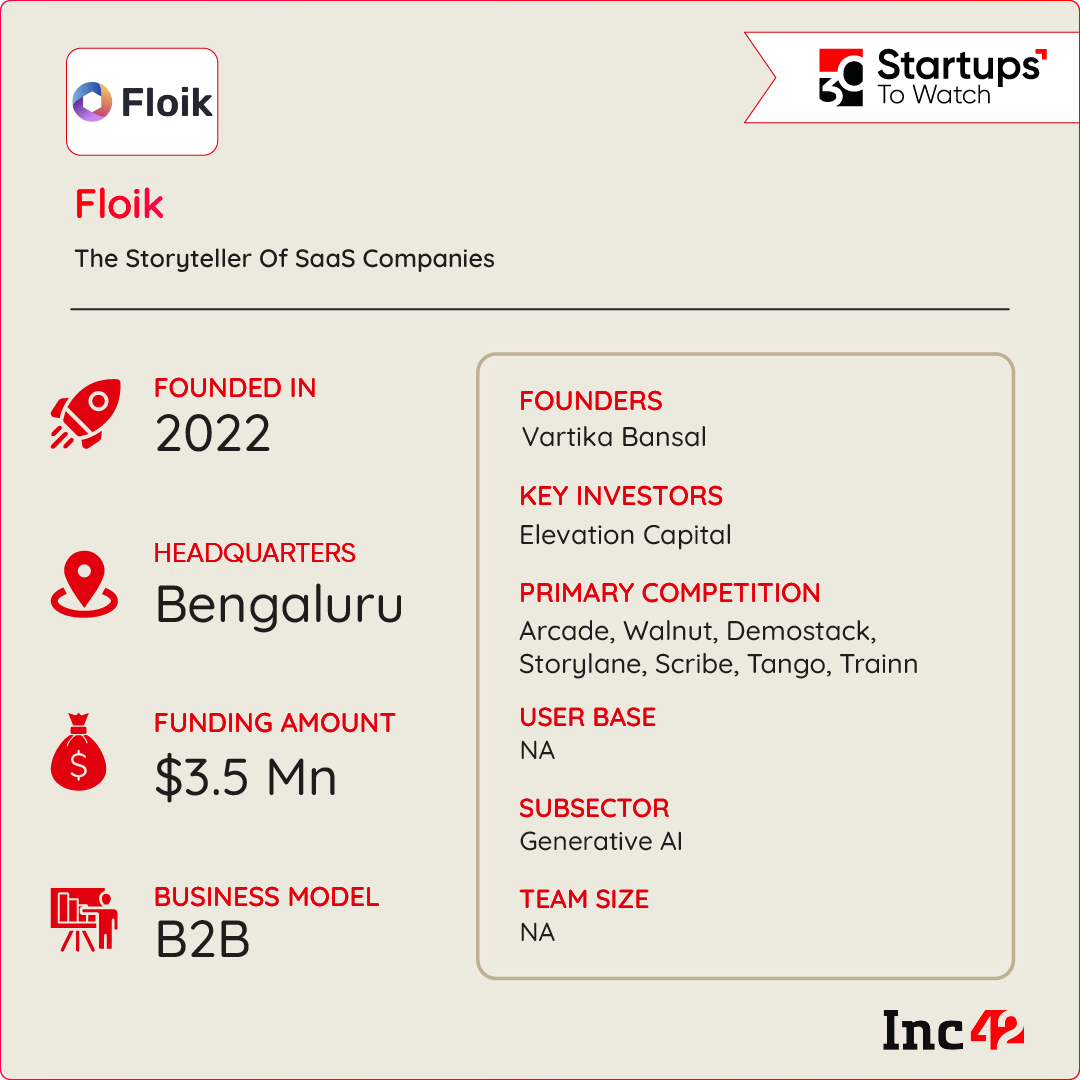
The Storyteller Of SaaS Companies
Thousands of SaaS companies have come up across the world, each competing with dozens that offer similar products and services over a similar sliver of market share. Given the competitive landscape in the space, conveying the right message plays a pivotal role in aligning the needs of individuals or businesses with your products and services.
Understanding this, Vartika Bansal and Vidyasankar Krishnamurthy founded Floik in 2022. Bansal’s struggle to find, purchase, and effectively implement SaaS tools led to the ideation of Floik, a platform that showcases SaaS products effectively. Today, the Bengaluru-headquartered startup positions itself as the storyteller in the SaaS industry.
Floik’s product offers a diverse range of use cases, including interactive knowledge base content, feature announcements, internal communication, ongoing customer support, and product-led blogs. The platform allows users to effortlessly record workflows and transform them into interactive demos, explainer videos, or step-by-step guides using an intuitive editor.
Operating across India, the US, Singapore, and Europe, Floik transitioned from beta to a full-fledged platform in July 2023. The startup monetises its platform with a subscription-based revenue model, including a Pro plan at $29/month and a Teams plan at $499/month.
The startup’s short-term goals include global market expansion, team scaling and user base growth by 2024. Meanwhile, Floik aims to invest in technology, diversify its product portfolio and forge strategic partnerships in the long term.
Growtomation
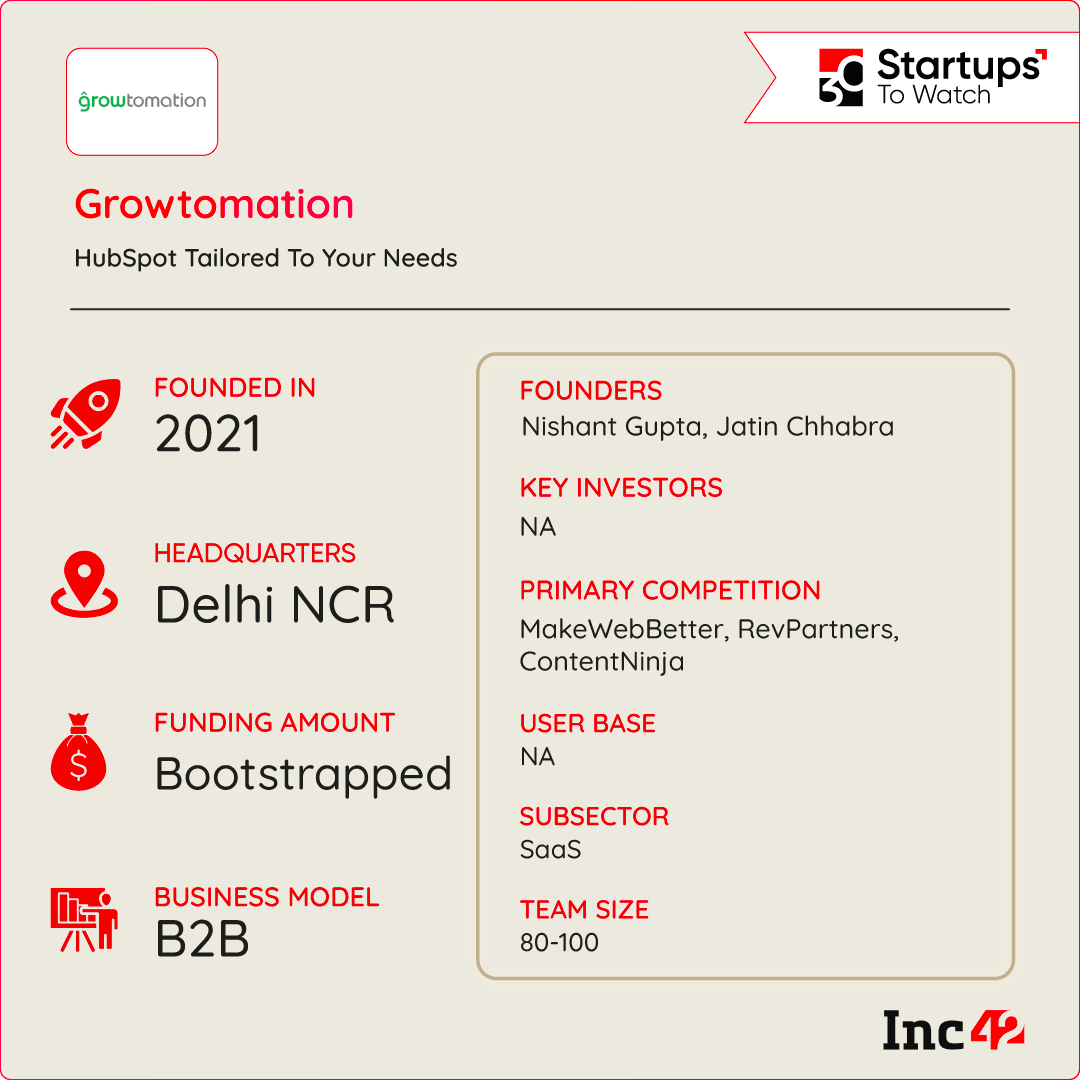
HubSpot Tailored To Your Needs
HubSpot is one of the top companies that competes with giants like Salesforce and Zoho in the CRM space. While its platform’s versatility allows for plugin integration, this often necessitates significant resources — both human and financial — to tailor it to specific requirements.
Founded in 2021 by Nishant Gupta and Jatin Chhabra, Growtomation addresses this challenge by offering customised HubSpot solutions, which are designed to streamline and optimise marketing and sales processes. The startup primarily serves the US market and has collaborated with over 350 companies spanning various industries.
Growtomation facilitates seamless integration across sales, marketing, CRM, service, and web development operations. After conducting a thorough audit for potential clients, Growtomation defines all HubSpot deliverables and subsequently implements them. Following this, the startup provides support while adopting the new HubSpot implementations and fine-tunes them to align with specific needs.
In addition to HubSpot customisation, the startup enables companies to incorporate generative AI solutions into their workflows, encompassing strategy development, training, capacity building, development, deployment, and data management. This integration enhances automation and boosts productivity for businesses.
HaiVE
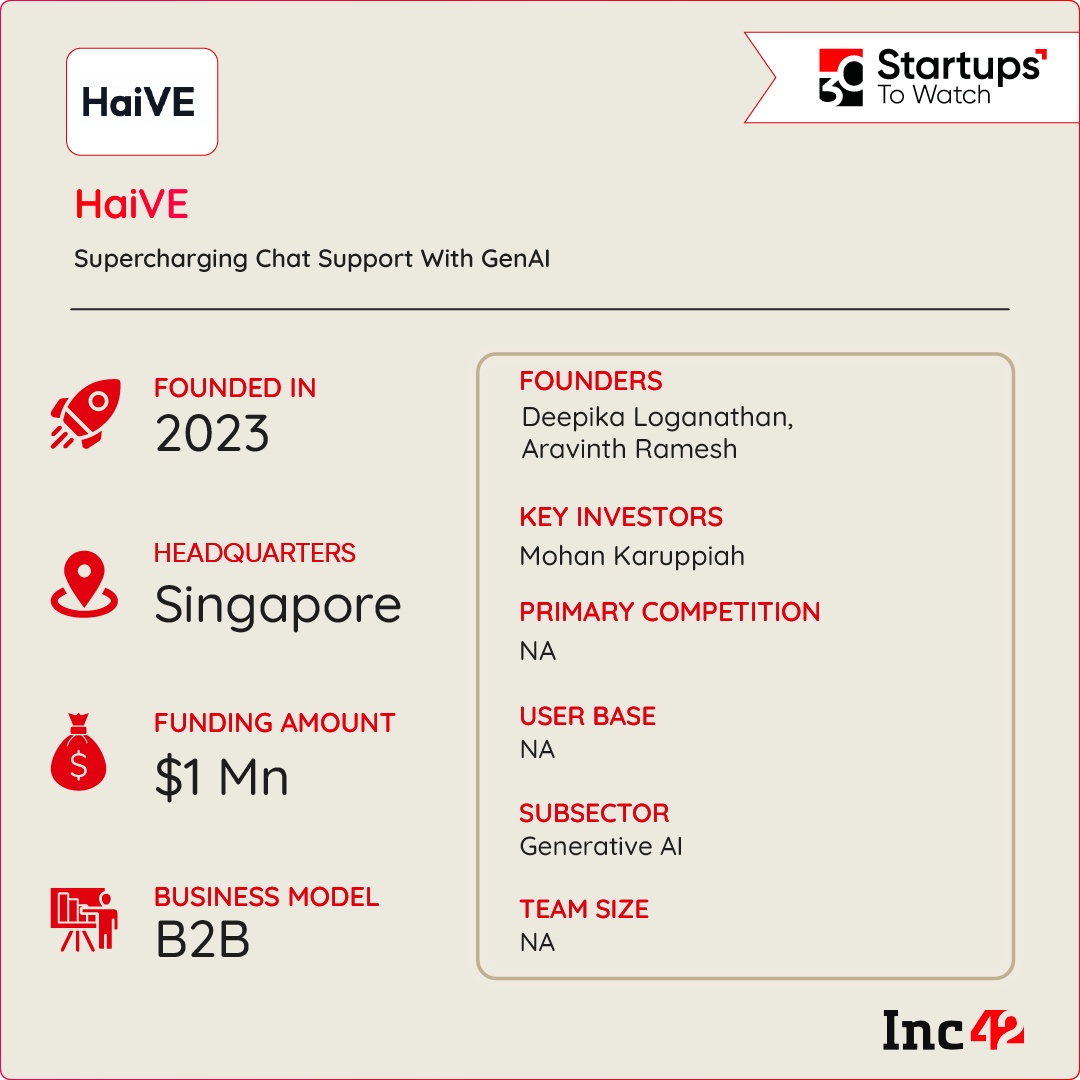
Supercharging Chat Support With GenAI
Generative AI revolutionising industries, with customer support being at the forefront. From chat support to how-to guides, GenAI platforms are doing it all. However, most of these platforms require companies to upload sensitive user data to their servers, posing a security risk.
Incorporated in 2023 by Deepika Loganathan and Aravinth Ramesh, HaiVE brings AI to the premises of its customers, developing LLM models that run off a company’s servers. The startup builds and trains chat support AI for companies looking to automate customer support. The AI can integrate across several platforms, including Salesforce, Freshworks, Shopify and WooCommerce.
What sets HaiVE apart is its commitment to data security. The intellectual property generated during the process remains the customer’s property. Additionally, HaiVE offers customised AI training, tailoring solutions to specific use cases, eliminating the need for generalised intelligence in many contexts.
HaiVE monetises its platform through a one-time setup cost, varying based on user requirements, and charges for ongoing maintenance and support.
House Of EM5
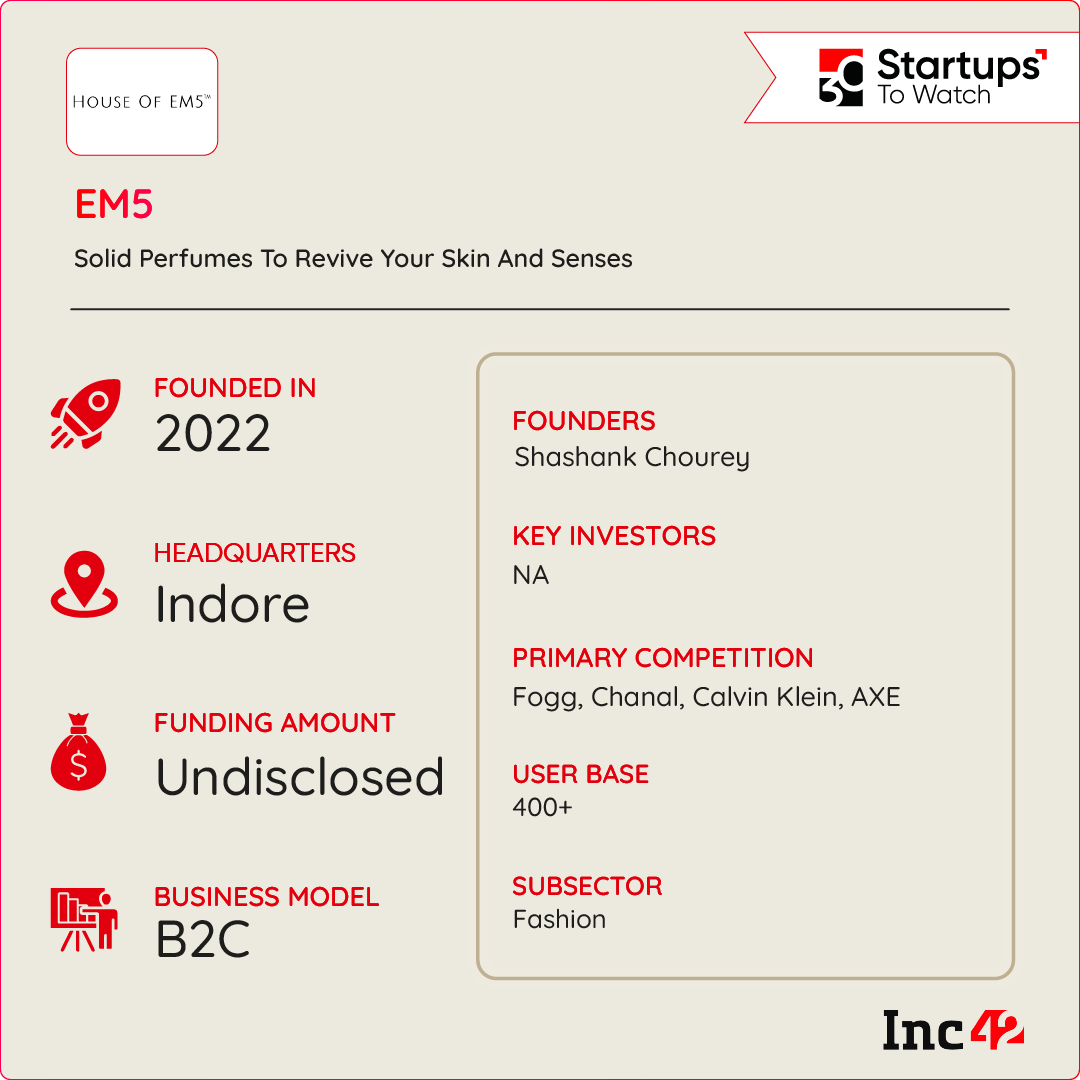
Solid Perfumes To Revive Your Skin And Senses
Fragrances are an integral part of personal grooming for individuals of all genders, and the Indian market is replete with brands offering a variety of products. Unfortunately, many of these products contain harmful chemicals like Parabens, linked to skin cancer, and Phthalates, which can disrupt hormones.
House of EM5, a D2C fragrance brand founded by Shashank Chourey in 2022, addresses these concerns by curating products made from sustainable ingredients. The startup proudly asserts that its products are entirely free from parabens, sulfates, silicones, and all other carcinogenic chemicals. EM5 has developed a range of fragrance products in multiple forms, including sprays, roll-ons, mists, creams, beard balms, foot sprays, candles, and reed diffusers.
In addition to its core product line, the D2C brand offers curated gift sets and an annual subscription package that includes five fragrance samples delivered to customers at a rate of INR 1,999 per month. Since April 2023, EM5 has maintained a monthly revenue run rate of INR 75 Lakh.
Hypergro.ai
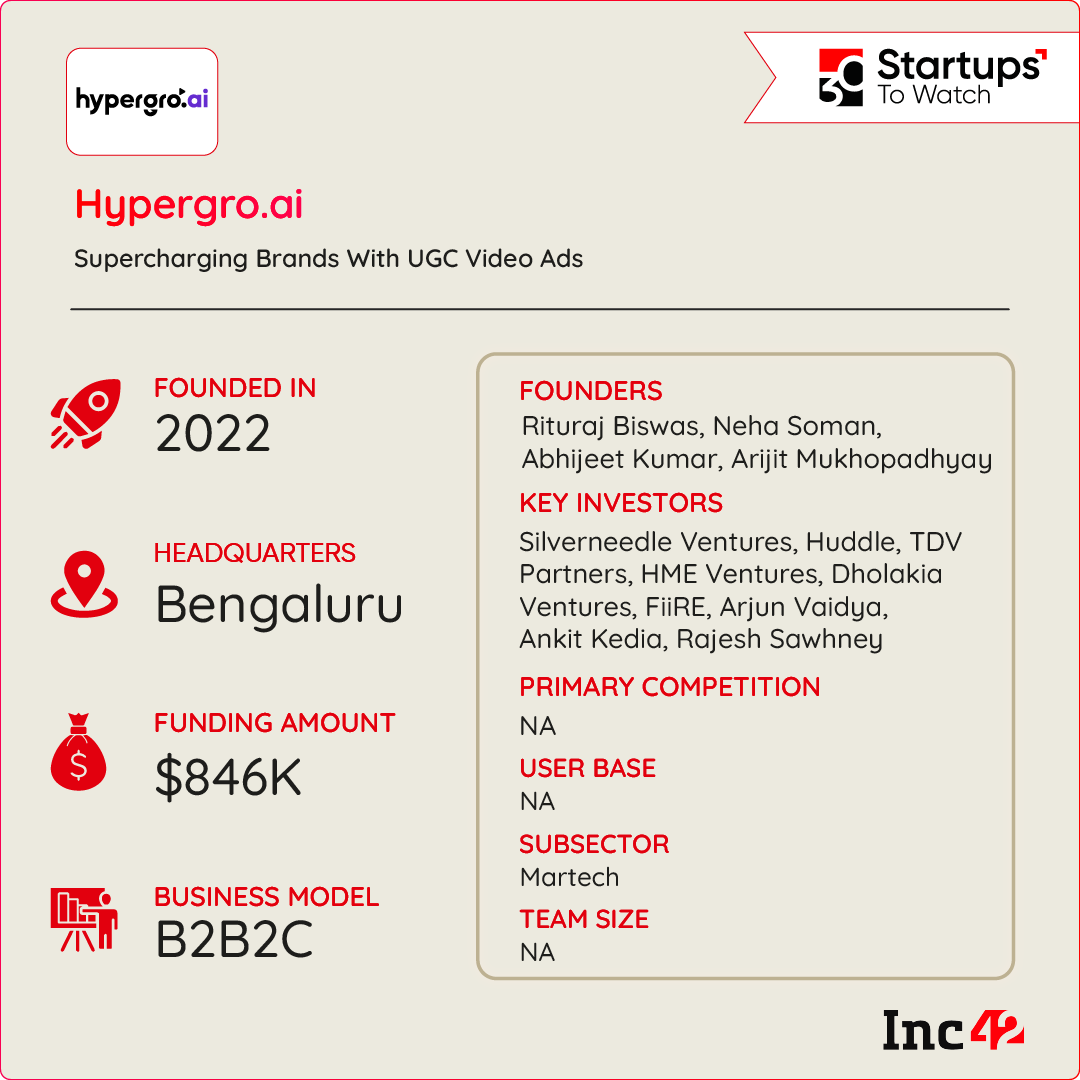
Supercharging Brands With UGC Video Ads
In today’s digital landscape, rising customer acquisition costs (CAC) often consume substantial budgets without delivering satisfactory returns. This challenge is exacerbated by poor returns on ad spend (ROAS), even with substantial investments.
Hypergro.ai, founded in 2022 by Rituraj Biswas, Neha Soman, Abhijeet Kumar, and Arijit Mukhopadhyay, offers a solution. This startup empowers brands to create compelling video ads using user-generated content (UGC).
Hypergro.ai’s AI-powered platform connects brands with creators who can craft videos that resonate with their target audience. The platform also enables content creators to monetise their work by collaborating on UGC-based ads for brands.
Additionally, Hypergro.ai provides a comprehensive platform for brands to oversee the video creation process and monitor campaign results. The dashboard facilitates collaboration among multiple users, simplifies content approval processes, and tracks key metrics, all in one place.
The startup operates on a SaaS-like subscription model for brands to access its platform, with separate pricing agreements for brands and content creators on its platform.
InsideFPV
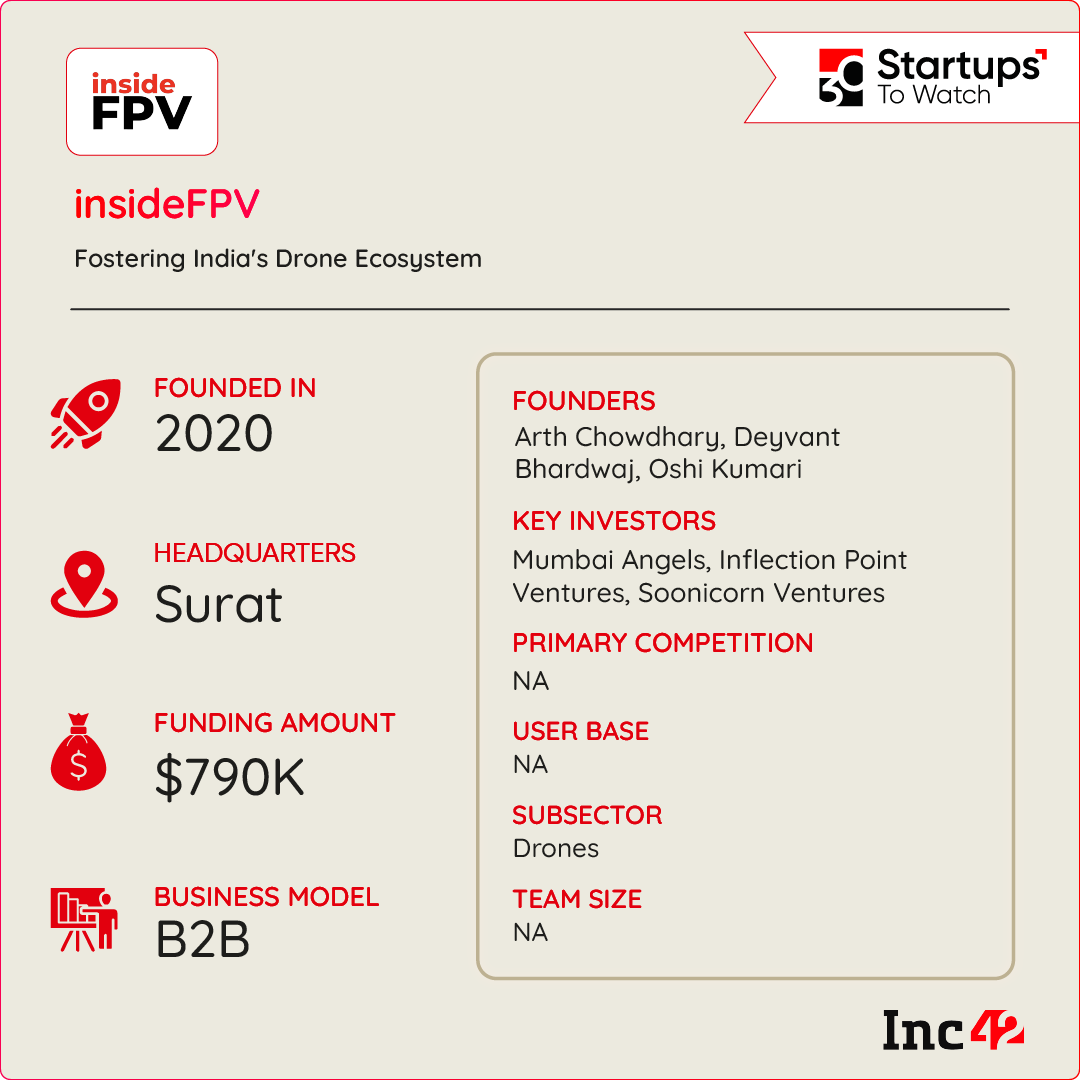
Fostering India’s Drone Ecosystem
India’s dependency on drone imports has been a notable concern. When geopolitical tension escalated in 2020, Deyvant Bhardwaj and Oshi Kumari founded InsideFPV to address this challenge.
It started by designing and building drones and educating Indians on how to ply them by setting up drone experience arenas in schools and colleges. Now, the Surat-based startup builds and sells drones catering to consumers, agriculture, and defence needs.
InsideFPV claims to have delivered more than 1,600 shipments and served more than 1,200 clients to date. It offers a comprehensive range of services, from selling ready-to-fly FPV (first-person view) drones to providing a wide selection of spare electronics and parts for repair and service needs.
The startup generates revenue through the sale of domestically designed, assembled, and software-integrated plug-and-fly FPV drones. They also offer spare electronics and parts for repair services as well as drone consultation services.
It plans to launch an upgraded consumer product line soon. By 2024, the startup has plans to establish drone experience arenas in malls akin to gaming zones, supply drones for educational labs, expand into the UAE market, offer type-certified agriculture drones, and advance its V2 product for defence applications.
Justbaat AI
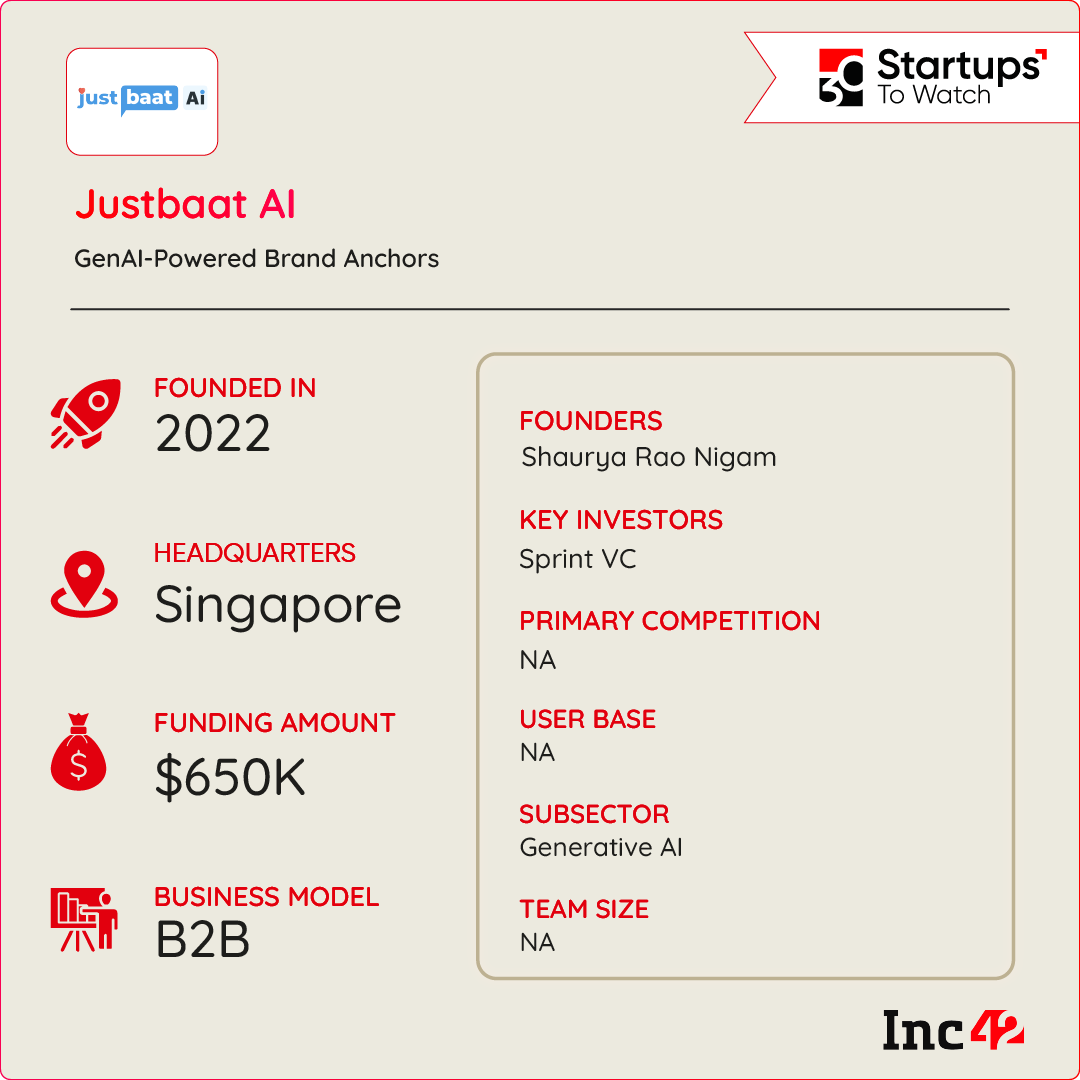
GenAI-Powered Brand Anchors
With nearly 500 hours of video content uploaded every minute, YouTube presents a vast landscape of content creators and consumers. However, video content generation remains a complex and time-consuming endeavour, involving meticulous planning, execution, production, and editing.
Streamlining this process is Justbaat, a video creation platform harnessing AI to simplify video production for users. It empowers users to create digital avatars, translate videos into 63 languages, and generate videos from text inputs.
Users can initiate video creation by uploading text, images, or videos onto the platform, which then utilises AI to generate a video based on the provided input.
The startup also offers the capability to craft lifelike images of individuals to serve as ‘anchors’ for video content. Justbaat’s AI models recreate the person’s voice, enabling content creation without requiring audio inputs. Furthermore, users can generate videos in various formats and export the final product to platforms like YouTube.
Kidbea
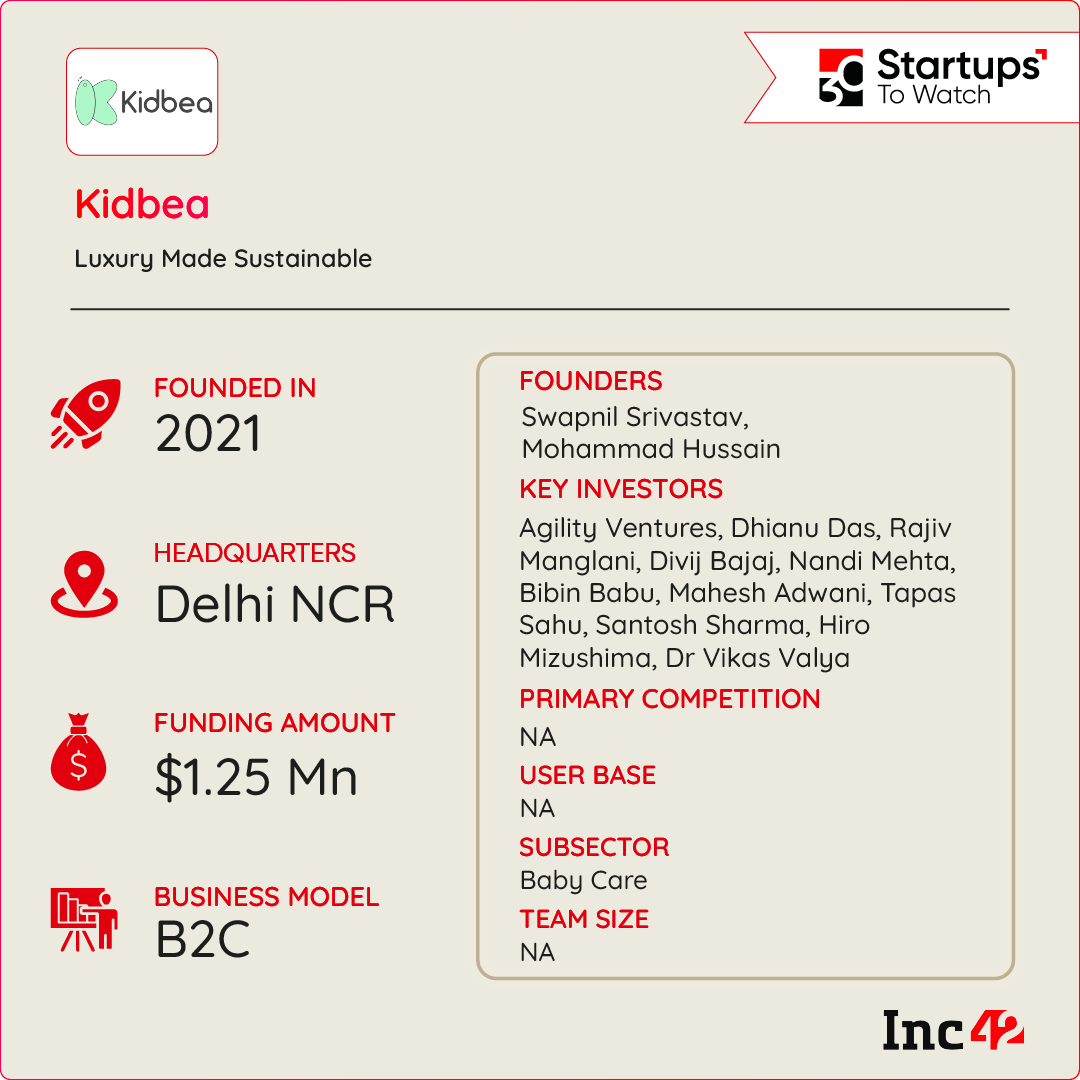
Kidswear Made Of Bamboo
Despite a plethora of kidswear options in the market, a significant portion of these products is made from synthetic materials, which can lead to allergies or skin irritations.
Recognising the need for natural materials in kidswear, Swapnil Srivastav, Mohammad Hussain, and Aman Kumar Mahto founded Kidbea in 2021. Kidbea is a kidswear brand that utilises bamboo to create its products.
Kidbea claims to address common issues such as germs from food spillage, skin rashes, and discomfort in newborns through its patent-filed herbal spill-proof textile technology, which also has antibacterial properties.
The startup offers a range of products, including reusable cloth diapers, clothing sets, rompers, t-shirts, and non-toxic soft toys. Kidbea currently operates in India and the UAE, with plans for further expansion in the MENA region and long-term aspirations to enter the US and European markets through a partnership with Lidl, a series of large-format stores, given that the CEO of Lidl has invested in the startup.
LISSUN
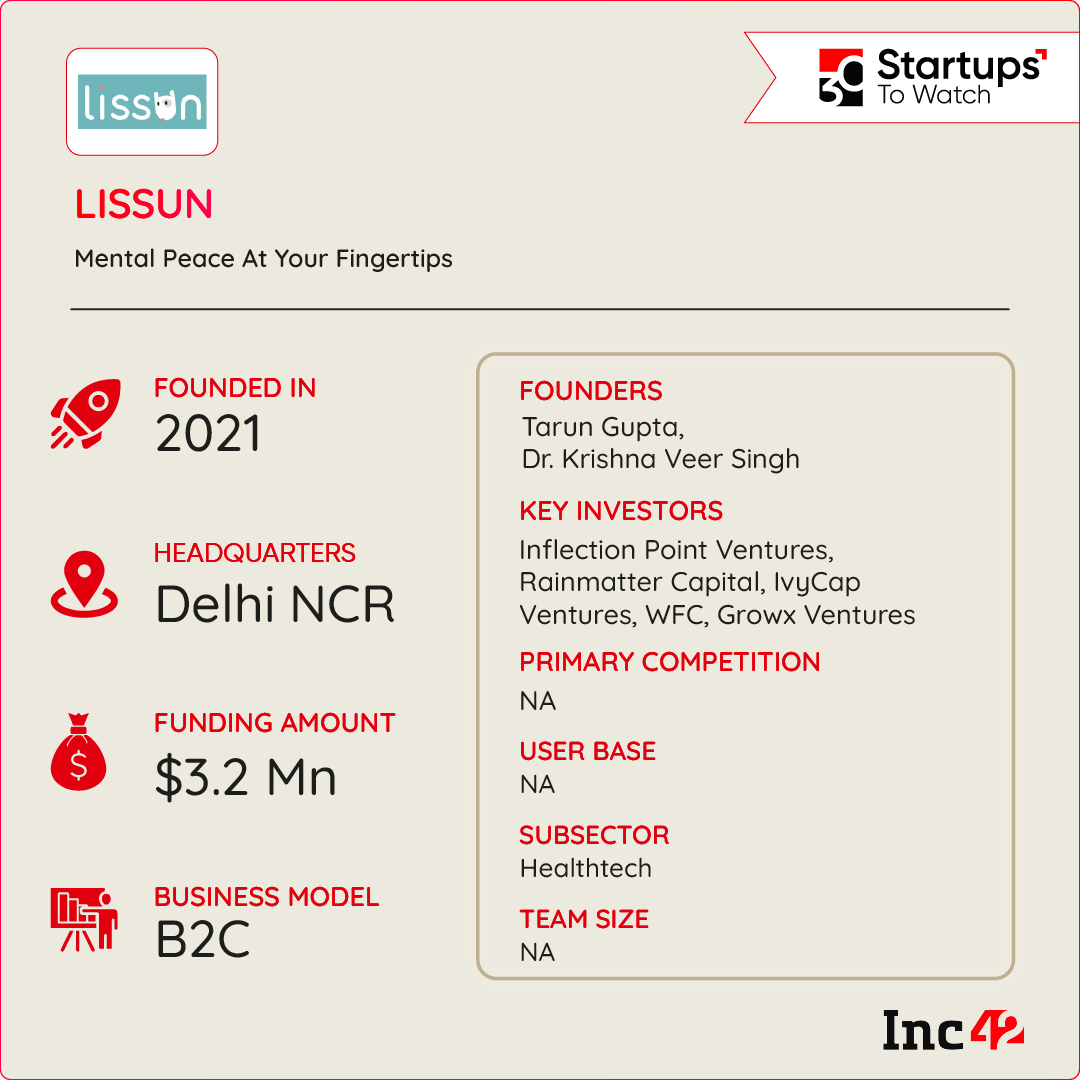
Mental Peace At Your Fingertips
Despite the increasing need for care, mental health remains a neglected aspect of health in India. According to a report by the National Institute of Mental Health and Neurosciences (NIMHANS), nearly 150 Mn Indians require mental health care but fewer than 30 Mn are seeking it.
Founded in 2021 by Dr Krishna Veer Singh and Tarun Gupta, LISSUN aims to make therapy more accessible, particularly for individuals with chronic illnesses such as cancer, kidney diseases and so on. LISSUN collects real-world data on these diseases via its partner hospitals and using its AI and ML-enabled engines, develops holistic therapy and mental healthcare into their journey.
LISSUN’s platform is focused on maximising micro-interventions in its user’s journey so that they are more accessible, repeatable and habit-forming. It has developed a telehealth platform, wellness journeys, gratitude journals and communities platform to help improve the mental health of its users. Further, the startup has also developed several child development centres – Sunshine – to address autism spectrum disorders.
The startup works on a B2B2C business model and gets a majority of its customers and revenue via its partner institutions. Working across 40+ cities, LISSUN is looking to expand its Sunshine centres across the country and launch contextualised products for its users.
Newtrace
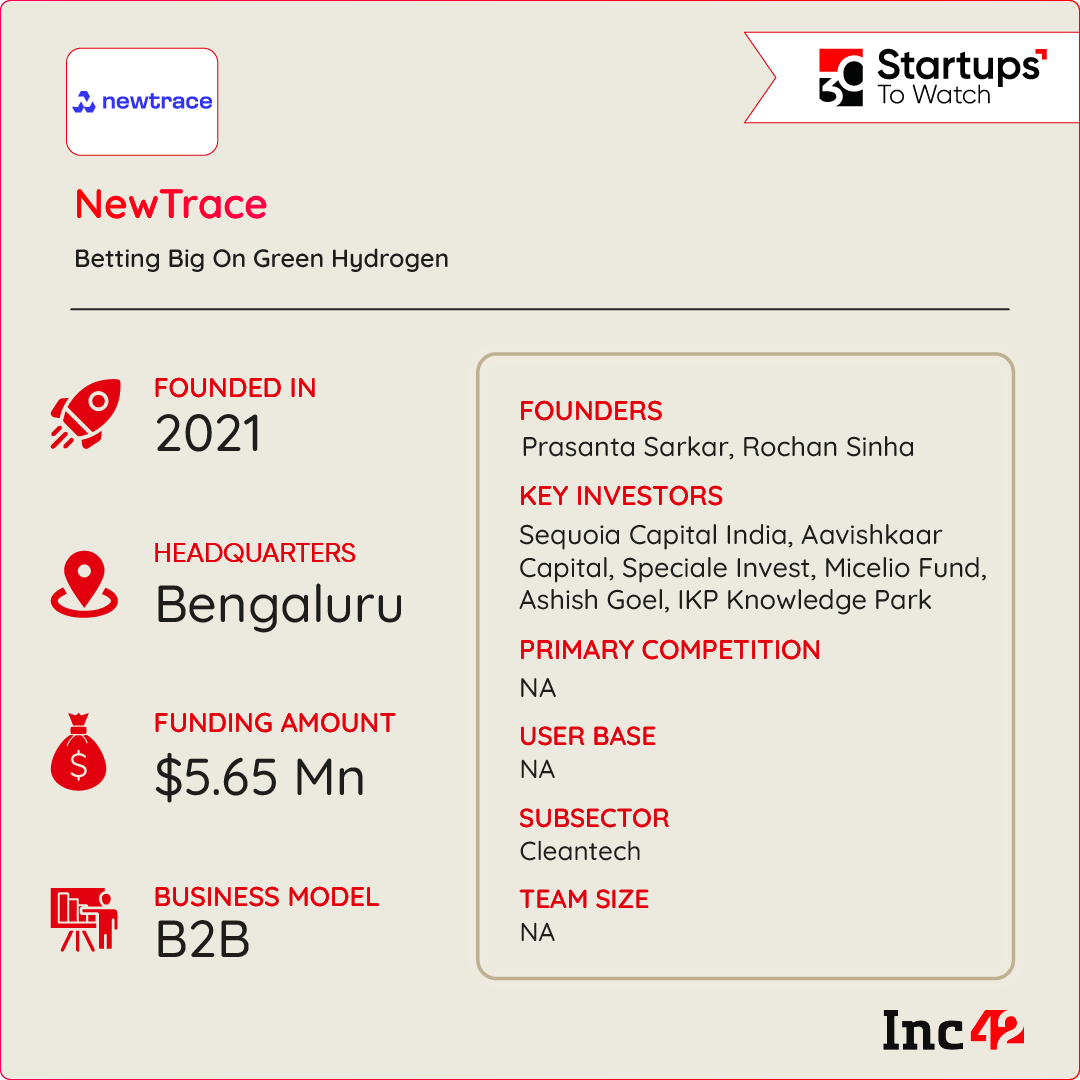
Betting Big On Green Hydrogen
Founded in 2021 by Prasanta Sarkar and Rochan Sinha, Newtrace focuses on sustainability and aims to address the pressing issue of fossil-fuel-derived hydrogen production, which generates over 900 Mn tonnes of CO2 emissions annually.
Newtrace’s proprietary electrolyser technology leverages fluid engineering techniques and an enhanced electrocatalyst, eliminating the need for rare earth metals. This results in ultrapure hydrogen while slashing production costs by an impressive 60%.
Moreover, Newtrace employs advanced manufacturing methods and real-time analytics, making their electrolysers not only cost-effective but also readily deployable across various industries.
Newtrace plans to extend its impact to multiple sectors, including refineries, fertilisers, chemicals, steel, cement and transportation. Additionally, they are exploring opportunities for long-term storage and conversion of green hydrogen and ammonia.
PierSight Space
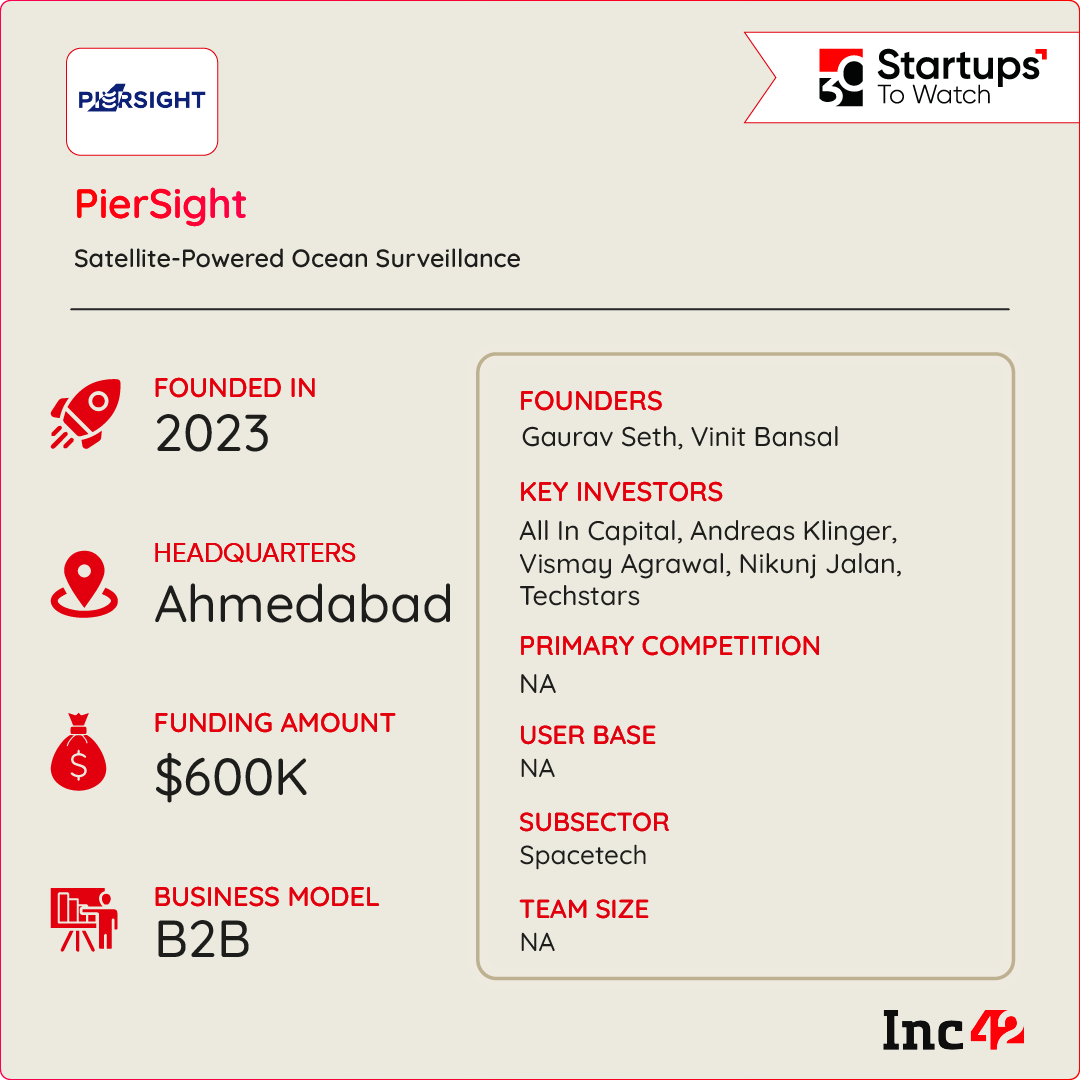
Satellite-Powered Ocean Surveillance
India is surrounded by three major water bodies – the Indian Ocean, the Arabian Sea and the Bay of Bengal. The larger Indian Ocean Region, which comprises these three regions, is a major travel route as 80% of the world’s maritime oil passes through this area, as per US Air Force University. However, this region is also fraught with issues such as piracy.
Founded in 2023 by ex-ISRO scientist Gaurav Seth and former US-based National Instruments employee Vinit Bansal, PierSight keeps a watchful eye over the high seas in all weather conditions, 24/7. The Ahmedabad-based startup manages this via a constellation of Synthetic Aperture Radar (SAR) imaging and Automatic Identification System (AIS) satellites.
PierSight’s objective is to provide continuous monitoring of maritime operations in 30-minute intervals, a service it claims to be unparalleled in the industry. The startup’s engagements span a diverse spectrum of clients, including island nations, commerce divisions of governments and environmental agencies, all of which share a pressing concern about the pervasive exploitation of Exclusive Economic Zones.
Over the next two years, PierSight is poised to launch the world’s first commercial satellite integrating SAR and AIS capabilities. The startup’s commitment to this endeavour is fully aligned with the United Nations’ Sustainable Development Goal 14, which underscores the importance of conserving and sustainably utilising oceans and marine resources for the benefit of present and future generations.
Peping
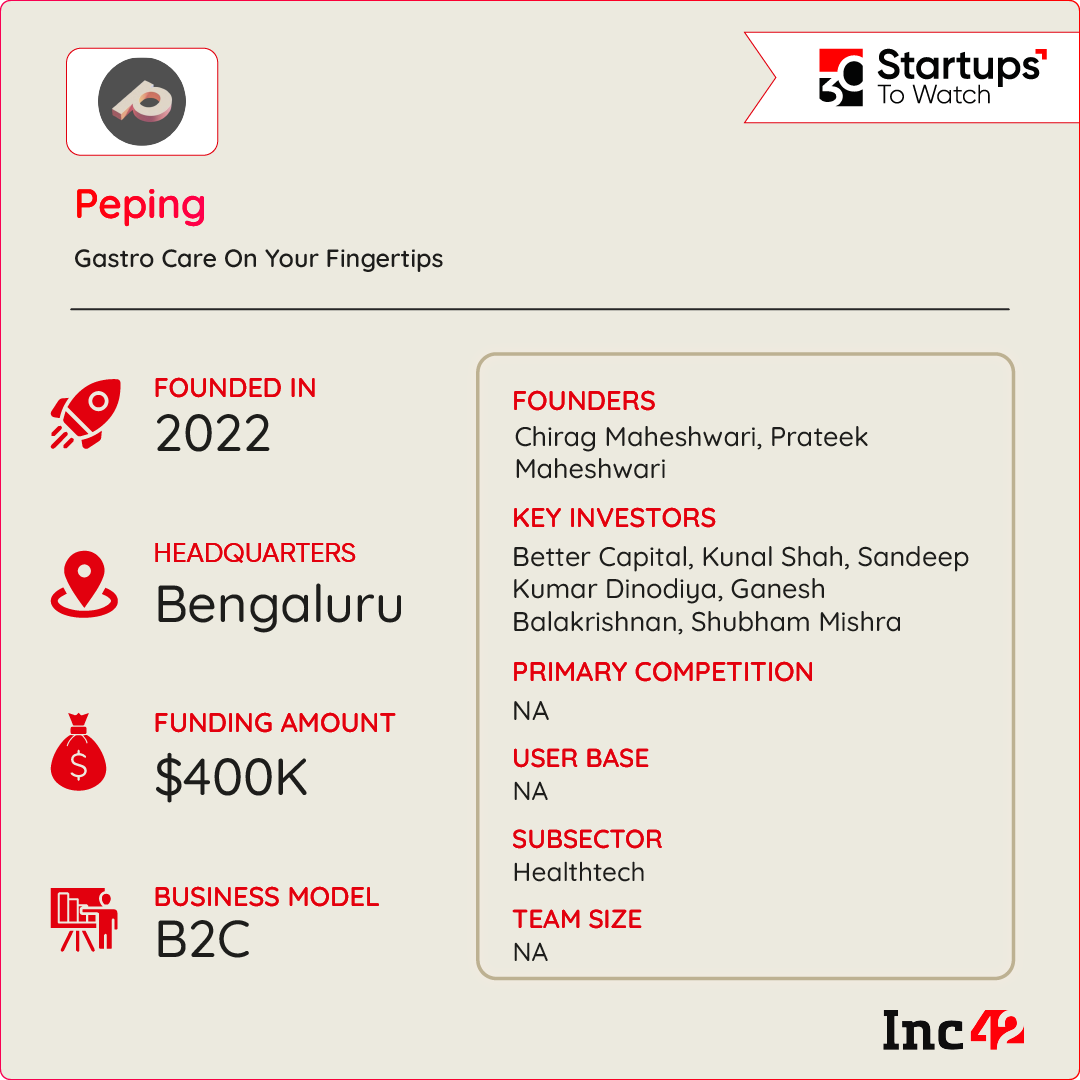
Offering Complete Gastro Care
According to a 2022 research paper, 18% of Indian adults suffered from chronic gastrointestinal problems, with numbers only rising with age. While India has seen a surge in people becoming more health-conscious post-pandemic, those already suffering from chronic gastrointestinal issues face hurdles in getting the correct care.
Peping founders Prateek Maheshwari and Chirag Maheshwari saw the gap for an end-to-end chronic gastric management and health platform, and they went the digital way to solve the problem.
Founded in 2022, the startup offers care plans for managing diseases and disorders such as IBS (irritable bowel syndrome), SIBO (small intestinal bacterial overgrowth), GERD (gastroesophageal reflux disease) and Dyspepsia, among others. The solution includes a holistic and personalised approach to dietary interventions (focus on healthy eating) with lifestyle interventions (stress management, physical activity).
Peping’s team of gastro and hepatology doctors, nutritionists and lifestyle coaches claim to deliver a patient-centric care plan to manage and reverse chronic gut health issues that have become especially prevalent thanks to urbanised lifestyles.
The company has a suite of products with proprietary formulations containing high-quality probiotics. Currently, the startup is focused on finding the right go-to-market approach and is testing various strategies to streamline its unit economics.
Portkey.ai
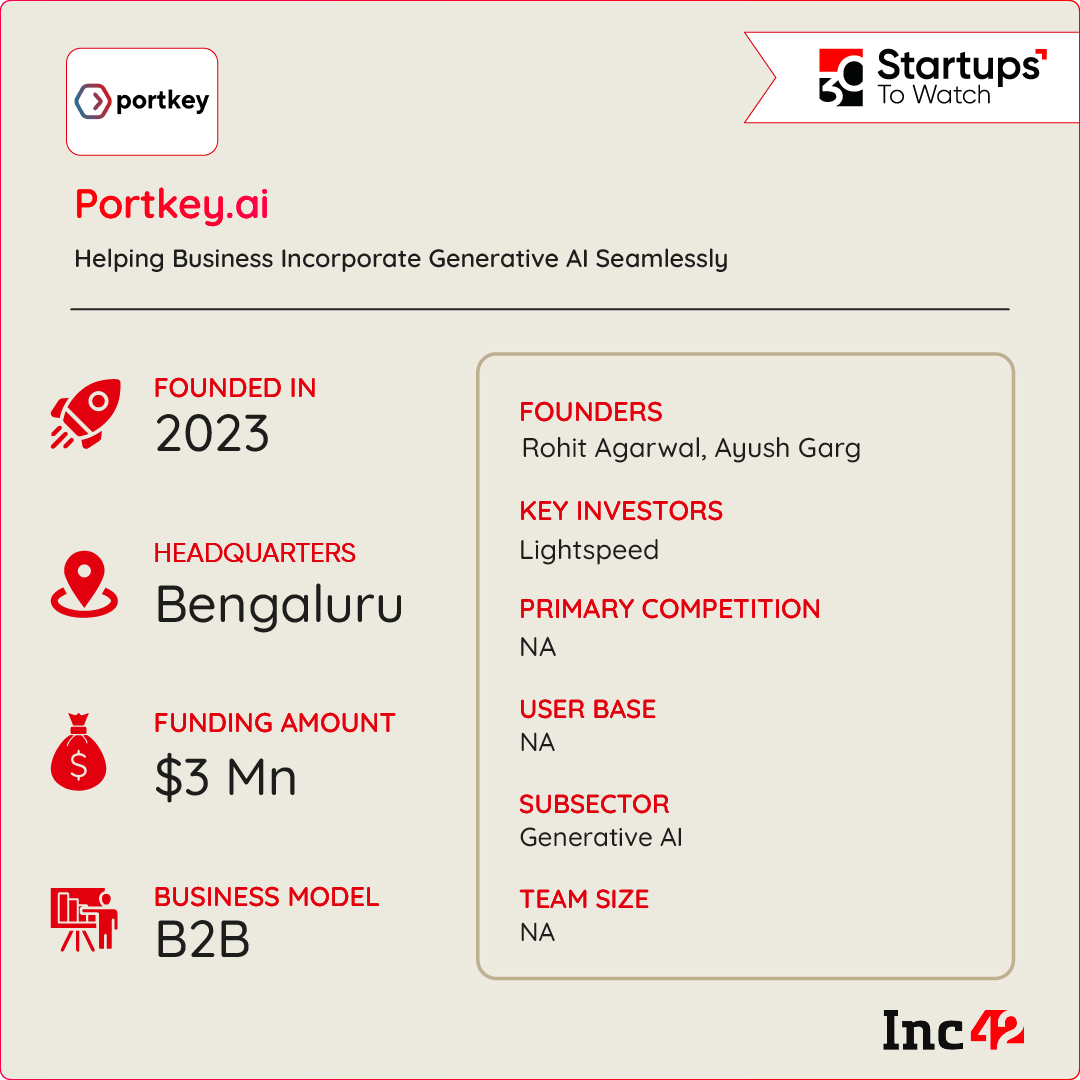
Helping Business Incorporate Generative AI Seamlessly
Many startups and corporations are integrating generative AI capabilities into their products to enhance customer experiences. From recipe suggestions to improved product listings, the applications are diverse. However, managing and deploying large language models (LLMs) can be complex.
Founded in 2023 by Google alumni Rohit Agarwal and Ayush Garg, Portkey.ai simplifies this process. The startup offers three key products — model management, prompt management, as well as monitoring and analytics.
Portkey.ai provides a centralised platform to manage all LLM models, including versions, configurations, and parameters. The platform simplifies the often challenging task of handling multiple models.
Additionally, the platform allows companies to manage all LLM prompts in one place, facilitating prompt experimentation and result optimisation. Finally, it offers real-time monitoring and analytics of LLM usage, enabling businesses to identify and address potential issues promptly.
Portkey.ai’s platform is available as a cloud-based SaaS product, eliminating the need for businesses to set up complex infrastructure. Companies pay a monthly fee based on the number of LLMs they manage and the volume of traffic they route through the platform.
Rebolt Network
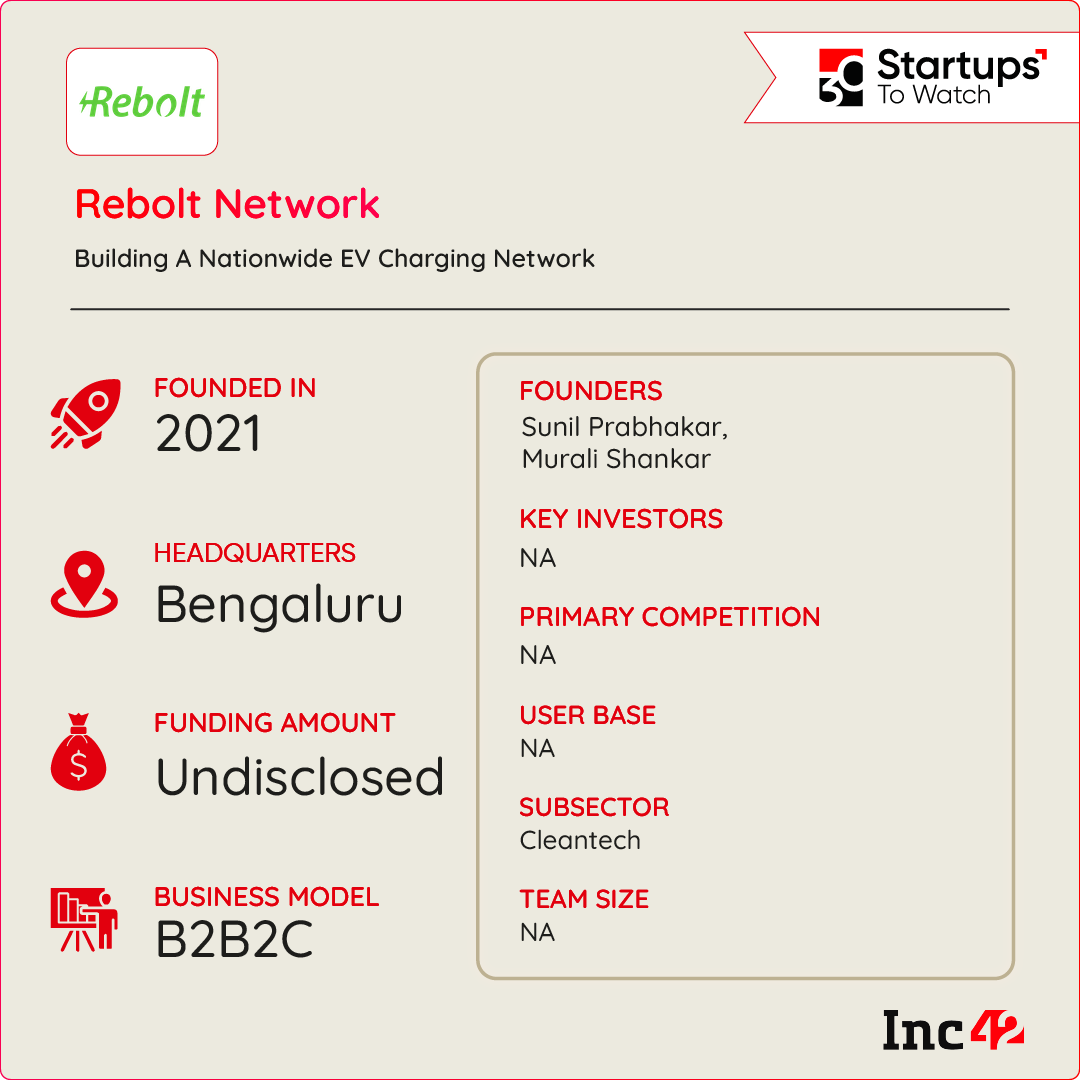
Establishing a Nationwide Charging Network
As of July 31, 2023, the Bureau of Energy Efficiency (BEE) reported 10,967 operational public EV charging stations in India, equipped with 15,493 EV chargers. Despite the government’s ambitious goal of installing 5 Lakh public EV charging stations by 2027, the rapid surge in EV adoption across India has outpaced the growth of public charging infrastructure.
The inception of Rebolt dates back to 2021, when its founders, Murali Shankar and Sunil Prabhakar, recognised the crucial need for robust charging infrastructure to foster EV adoption. The startup is on a mission to create what it proudly claims as India’s largest public EV charging network, strategically placing charging stations in urban hubs, along highways and in key commercial areas.
Through the Rebolt mobile app, EV owners can effortlessly locate charging stations on a map, reserve charging slots in advance, or check real-time charger availability before arriving.
Once at the charging station, EV owners can scan a QR code to initiate charging, with automatic payment deducted from their wallet upon session completion. Rebolt charges a uniform rate of INR 18 per kilowatt nationwide, but they also offer a subscription plan that grants users unlimited charging for a monthly fee.
Additionally, Rebolt generates revenue through partnerships with businesses hosting their chargers. Hosts are provided with a comprehensive dashboard that allows them to manage their charger locations, track bookings and usage, monitor commissions due, process payments, and more.
SayF
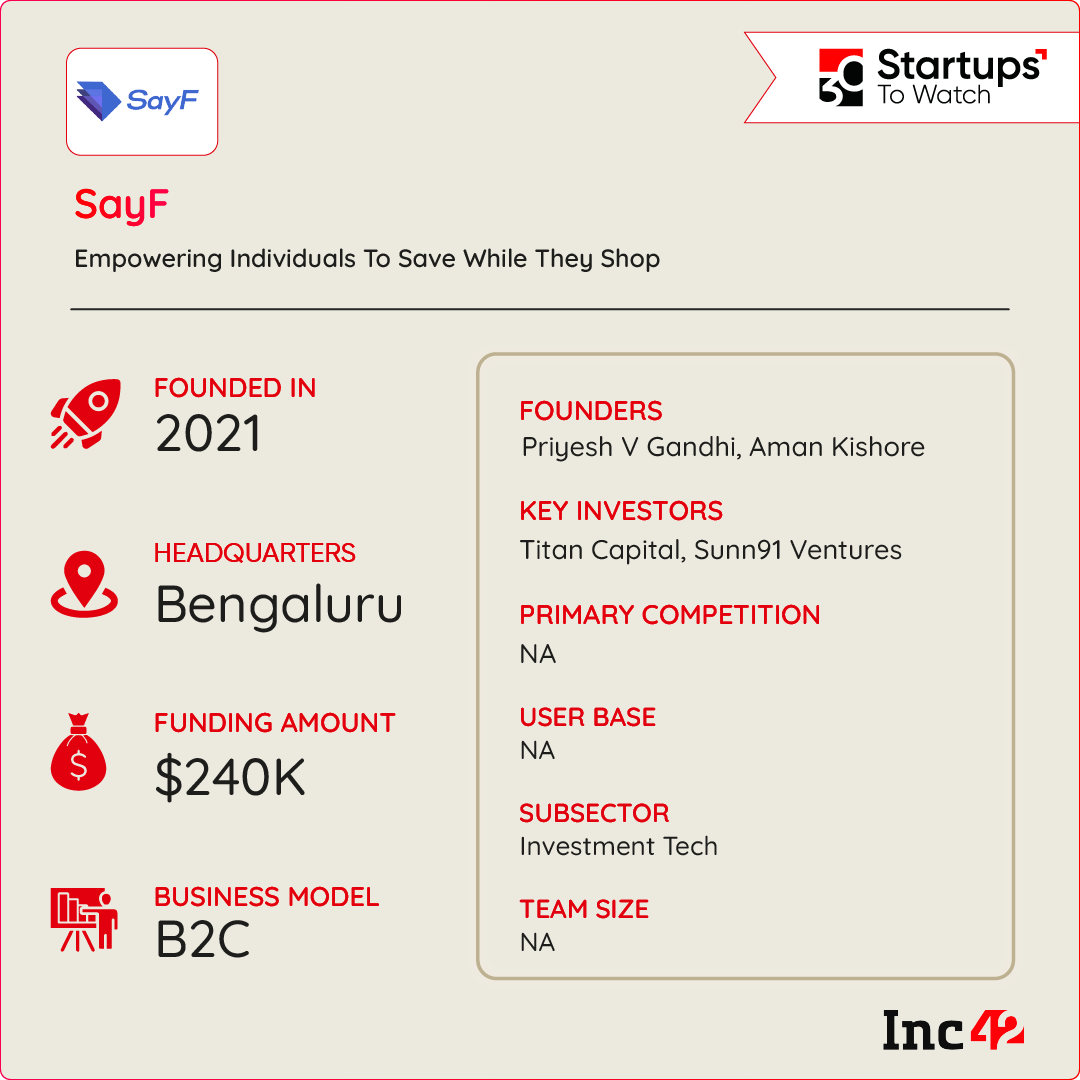
Empowering Individuals To Save While They Shop
India has one of the largest populations of online shoppers in the world, with the number set to reach 350 Mn by 2025. However, the prevalence of dark patterns on major online shopping sites ensures that customers end up spending more than they should, shrinking their savings.
This enabled Aman Singh and Priyesh Gandhi to incorporate SayF, a platform that empowers users to save money while shopping online. The startup, which has partnered with over 400 brands, offers discounts ranging from 3% to 15% on top of brand or platform discounts.
Users can access these discounts by selecting SayF’s gift card as their payment method during checkout. Following a transaction, the app invests the discount’s value into the user’s SayF account, which can then be utilised to invest in various financial products. SayF’s flagship product is its savings platform, allowing users to either save while shopping or set specific savings rules for regular saving and improved returns.
The startup primarily earns commissions from brand partnerships and stands to gain commissions when users invest their savings via SayF’s platform.
Currently, SayF is developing a UPI layer and plans to evolve it into a Credit-on-UPI system by 2024, with a target of reaching 1 Mn users by then. In the long term, SayF aims to expand globally, integrate blockchain capabilities, and reach 10 Mn users by 2026.
Sheshi AI
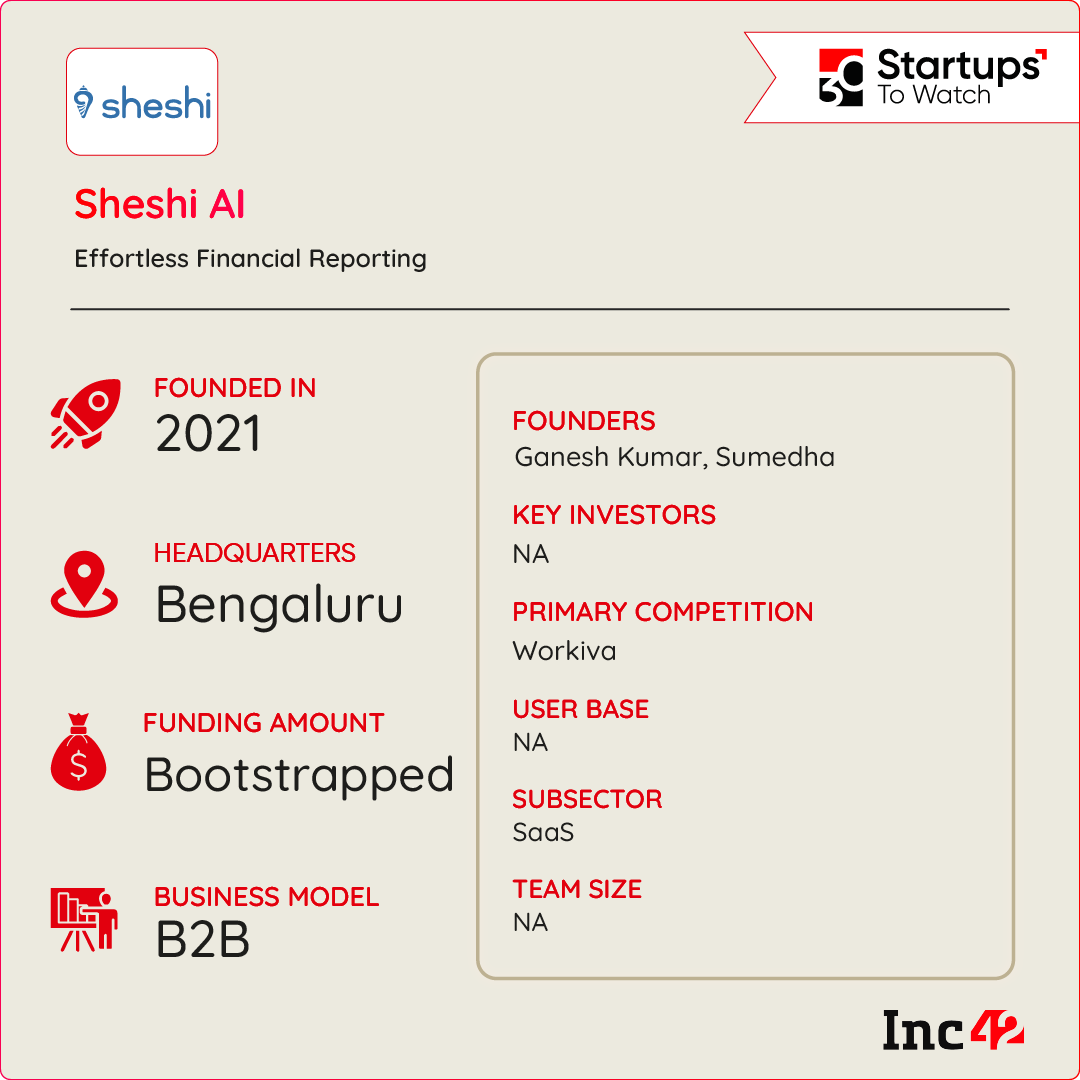
Effortless Financial Reporting
Reporting financial performance is one of the most crucial activities for any for-profit company, as they have a fiduciary responsibility towards their stakeholders and sector regulators to present their performance. However, this task is far from simple, especially for tech startups with complex business models and intricate revenue recognition systems.
Having been in the finance industry for nearly two decades, Ganesh Kumar and Sumedha saw the struggles of highly qualified professionals being reduced to the mundane tasks of putting out financial statements. The duo, themselves qualified chartered accountants, came up with the idea of an AI-enabled financial reporting system, setting up Sheshi AI in 2021.
The startup’s reporting platform, Sheshi FR, generates financial reports in under 30 minutes. The platform delivers print-ready financial statements that can be digitally signed and submitted for audits. The platform seamlessly integrates with major ERP systems, effortlessly fetching financial data. Additionally, AI-enabled ledger tagging minimises errors, ensuring streamlined data interpretation. Users also enjoy the flexibility to customise financial reports while remaining compliant with the latest GAAP regulations.
Sheshi AI operates on an annual subscription model for its SaaS platform. The startup’s short-term plans involve refining its product further and expanding into new geographies.
Svenklas
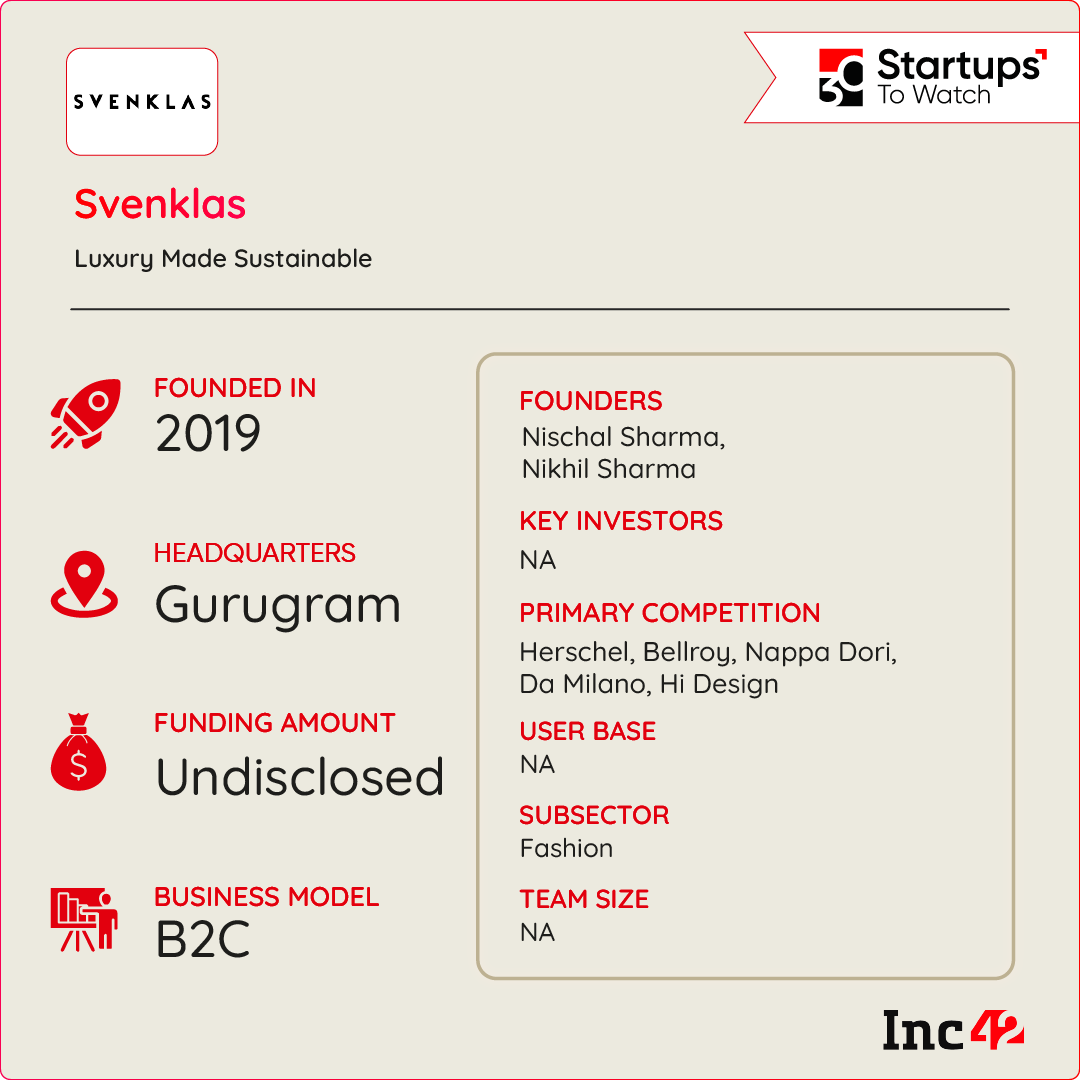
Luxury Made Sustainable
With the rise in the disposable income of individuals, India has witnessed a spurt in the demand for luxury goods, especially office and travel bags. According to Statista, luxury bags are now a $1.4 Bn market, which is expected to grow at a CAGR of 1.51% annually till 2028. However, such goods have a major environmental impact, which can’t be overlooked.
In a bid to cull the impact of such products on the environment, Nischal and Nikhil Sharma set up Svenklas, a brand that makes luxury bags from sustainable materials, in 2017. With a total of 24 SKUs across six categories, the brand’s flagship products are its unisex backpacks.
Svenklas, which manufactures its products in Gurugram and Noida, claims to ensure sustainability across its supply chain, including clean energy-powered manufacturing and fair wages to workers. The startup currently sells all its products online via its website and other ecommerce channels. Svenklas recently launched its offline stores in Delhi and Mumbai and stepped outside India by opening a distribution channel in the Middle East.
As of now, Svenklas has set its eyes on introducing new products, keeping its female audience in mind, while its long-term plans include expanding to the Southeast Asian market.
TaxNodes
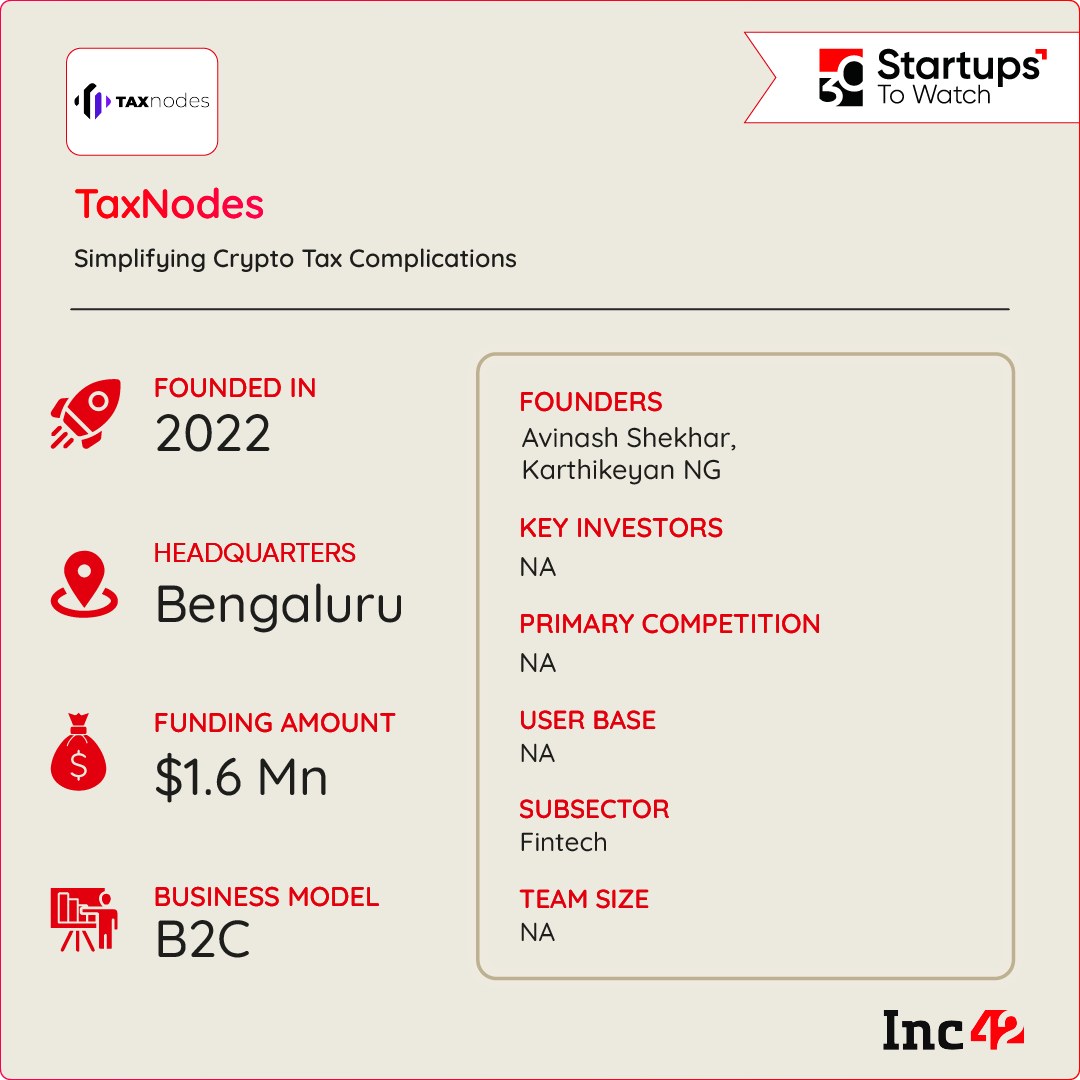
Simplifying Crypto Tax Complications
While India has not yet implemented comprehensive regulations governing cryptocurrencies, it did bring crypto transactions under taxation in July 2022. Founded in December 2022 by Avinash Shekhar, Singapore-based TaxNodes is a crypto tax startup that aims to simplify crypto profitability assessment, taxation, and reporting in India.
TaxNodes streamlines the tax computation process for both retail investors and cryptocurrency exchanges. The startup allows users to automate crypto taxation by consolidating transactions from multiple sources, including various exchanges, peer-to-peer trades, private wallets, and diverse blockchains, providing near real-time profit/loss calculations and portfolio tracking.
TaxNodes not only caters to individual investors but also assists crypto exchanges in enhancing their internal controls, automating crypto accounting and integrating with traditional accounting systems.
Furthermore, TaxNodes offers solutions to government regulators, empowering them to ensure tax and regulatory compliance among crypto users and exchanges through audit tools.
Teleport
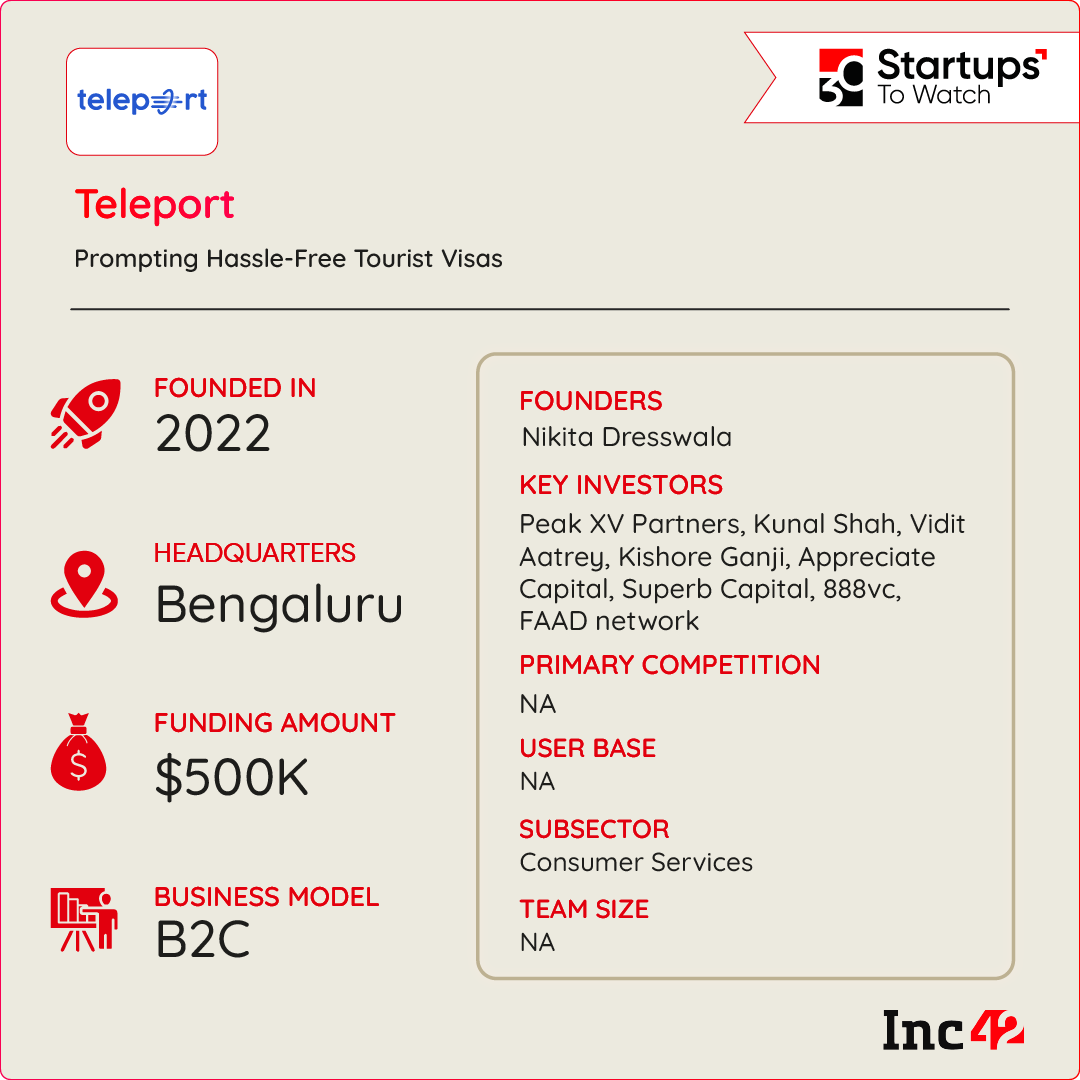
Enabling Hassle-Free Tourist Visas
Obtaining a tourist visa can be cumbersome and time-consuming, especially for individuals unfamiliar with the requirements. The extensive documentation and long wait times can disrupt travel plans.
Nikita Dresswala encountered these challenges during her three-week cycling journey across Southeast Asia. Her experiences, coupled with her visa application struggles, led her to establish Teleport in 2022. Today, the startup streamlines the visa application process for travellers by offering automated flows, guided steps, and data-driven decisions to maximise visa approval rates.
Teleport provides tourist visas for over 40 countries, including popular destinations like France, Spain, Italy, Greece, Malaysia, and more. Powered by AI and ML, the platform automates various tasks in the visa application process. It also leverages its AI and ML capabilities to provide users with personalised advice and recommendations.
The travel tech startup monetises its platform via commissions from visa applications and from more than 100 travel agents who use its platform. In the short term, Teleport aims to process 1 Lakh visas in 2023, with long-term plans to expand into other travel-related services, including forex, eSIMs, and insurance.
Ulipsu
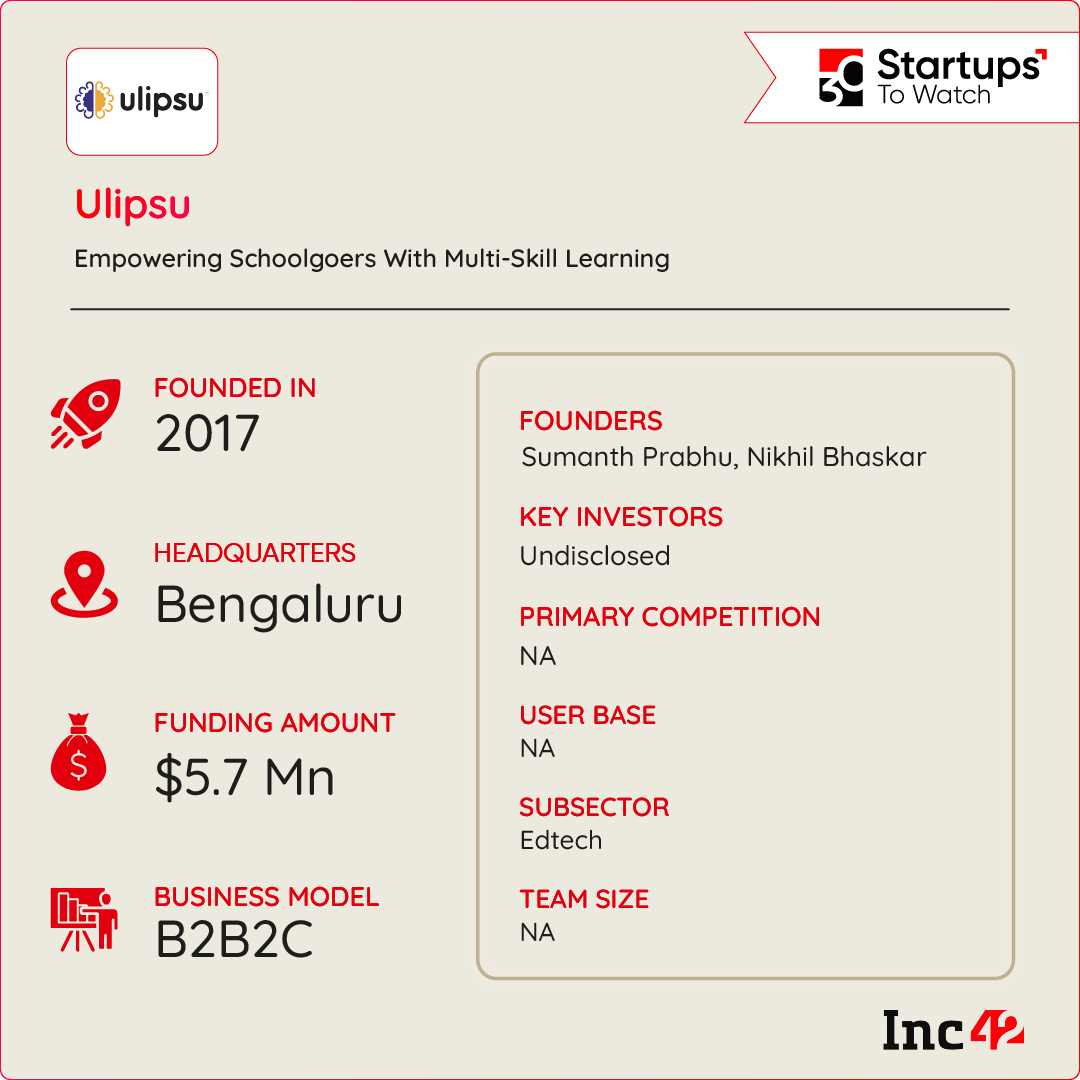
Empowering Students With Multi-Skill Learning
In India, the need of the hour is to align the skill sets that are taught in schools with the demands of industries. Addressing this, in the ever-expanding edtech universe, Ulipsu stands out as an OTT-like platform that offers a wide range of skill development courses for school students.
Set up in 2022 by Sumanth Prabhu and Nikhil Bhaskar, Ulipsu is an OTT-like edtech platform that offers multiple skilling courses for schoolgoers. The platform features basic to intermediate courses across multiple future-ready subjects.
Ulipsu delivers its courses through mobile and web apps, with partner schools incorporating them into their curricula. The gamified content fosters effective and engaging learning, converting passive screen time into active learning. The gamified content that the startup offers helps children grasp better, ensuring an effective and comprehensive learning process.
The startup aims to increase its user base from 350K to over 1 Mn by 2025, driven by its partnerships with schools across the country.
ZEVO
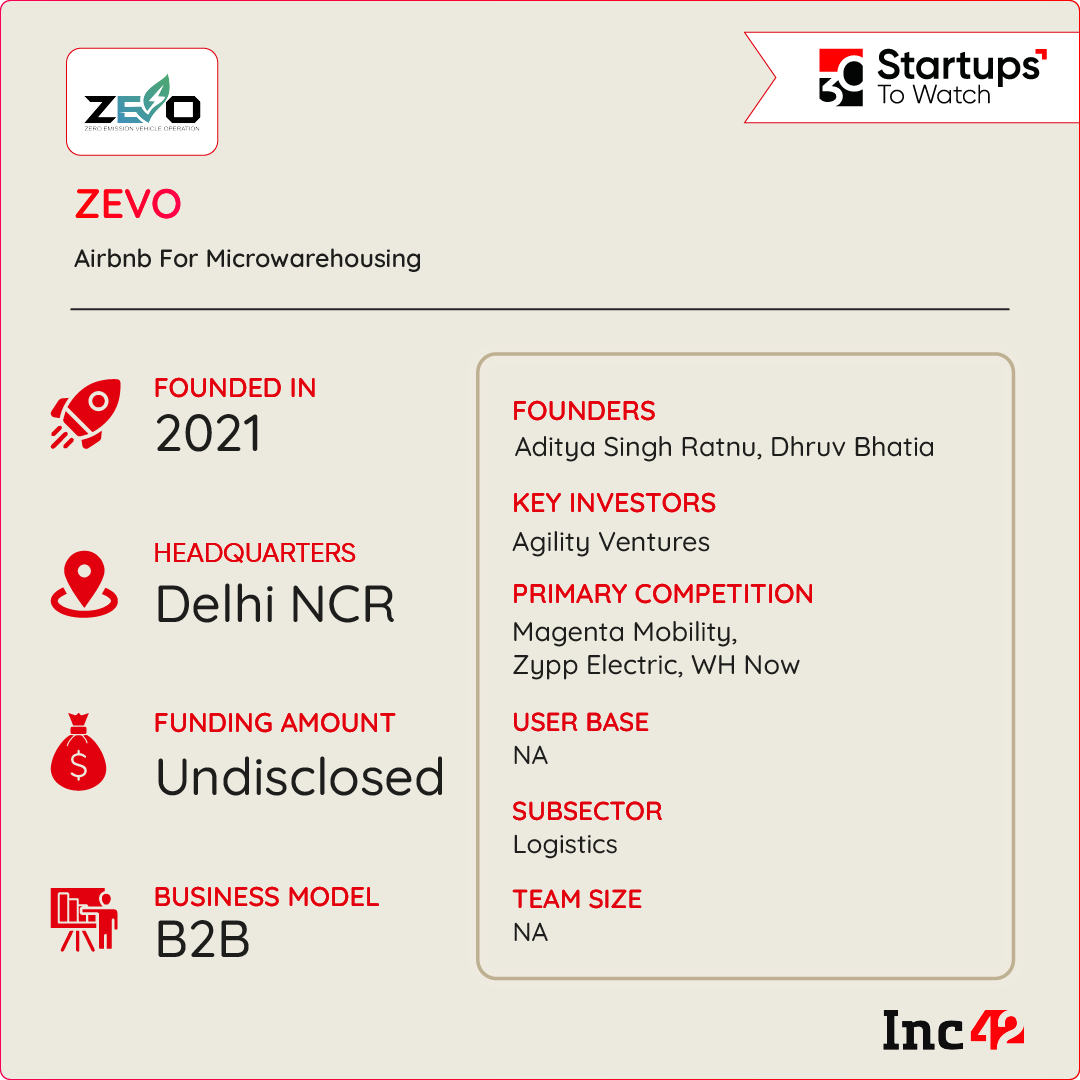
Airbnb For Microwarehousing
Per the European Environment Agency, the logistics industry is one of the largest contributors to carbon emissions in the world, accounting for nearly 25% of the total global annual emissions. Experts opine that these numbers may rise to as much as 40% if corrective actions are not taken. Access to sustainable mobility for businesses remains patchy, especially in India, which contributes to the ecological damage.
Chartered accountants and childhood friends Aditya Singh Ratnu and Dhruv Bhatia have first-hand experience in solving this problem even before they founded ZEVO in 2022. Their research on the electric mobility segment showed that the ecosystem lacked a suite of products and services that address sustainable mobility and micro-warehousing challenges.
As ecommerce fulfilment trends move towards same-day delivery and quick commerce, companies require sustainable solutions that address micro-warehousing (smaller delivery hubs) and last-mile logistics needs.
ZEVO’s core products include electric vehicle mobility as a service (EVaaS), micro-warehousing as a service (MWaaS), temperature-controlled refrigerated delivery, refrigerated micro-warehousing and agricultural supply chain electrification.
The startup enables integrated same-day fulfilment on a demand or subscription basis. Businesses can book EVs for various purposes such as deliveries, transporting goods, as well as forward and reverse logistics for both refrigerated and non-refrigerated products. The startup is currently operational in Delhi-NCR, Chandigarh, Jaipur, Lucknow, Ahmedabad, Pune and Mumbai.
In the short term, the startup is working to expand its electric fleet and geographic reach to 3,000 EVs and 16 cities, respectively.
[Edited by Shishir Parasher]




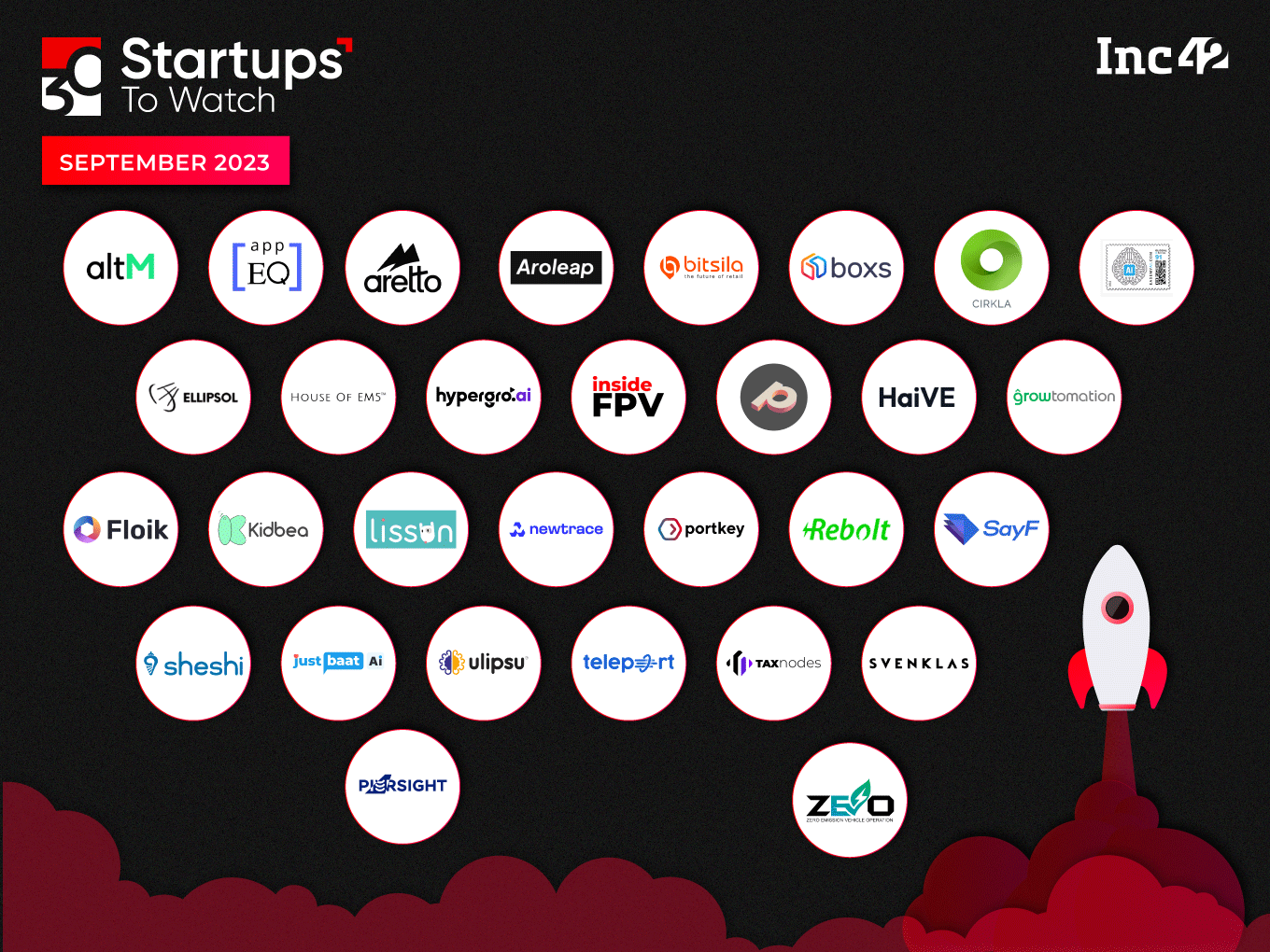





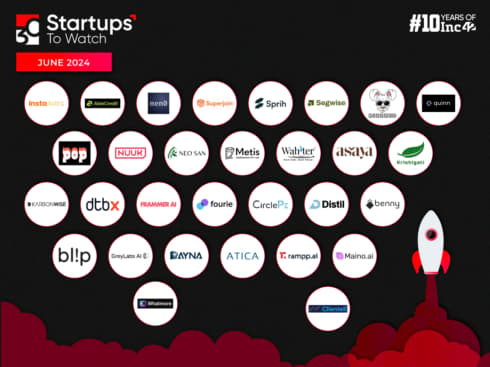
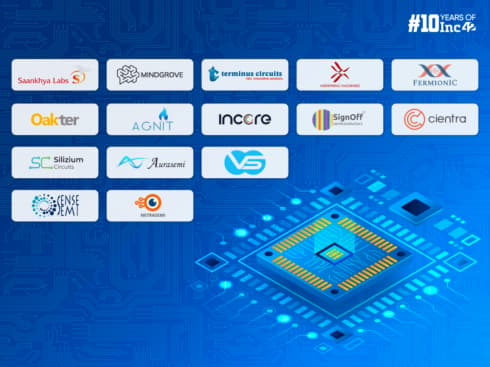




















 Ad-lite browsing experience
Ad-lite browsing experience